How to carry out market research for a hotel
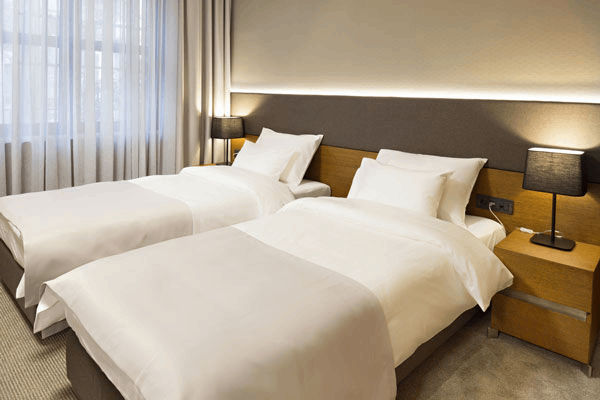
Whether you're a seasoned hotelier with years of experience behind your back or a first-time hotel buyer about to embark on the entrepreneurial adventure of a lifetime, if you want to open and operate a hotel, chances are you're wondering how to best go about conducting market research.
Market research for a hotel is not only essential in giving you a better understanding of the current state of the hotel industry (from how it's doing, to what concepts are hot or not), but it also helps you decipher how to mould different aspects of your business so that it attracts the right customers.
To guide you through this process, we've outlined the key steps in conducting thorough market research for a hotel.

The objectives of market research for a hotel
Evaluating the market potential of your business.
Market research for a hotel must meet several objectives, the first of which is to evaluate the commercial potential of the venture.
Indeed, whether you're taking over an existing hotel business or starting a hotel from scratch, it's vital to check that the market is not already saturated. If the supply of travel accommodation is already considerable in relation to the demand, the market could well suffer from the arrival of a new hotel. If the current supply (in terms of room capacity) cannot meet the demand, however, it will be in your best interest to launch a hotel.
Secondly, market research is designed to help you come up with a concept that's likely to be popular within your chosen location. To do so effectively, your best bet is to identify a customer segment whose needs currently aren't being met by the competition.
Finally, market research for a hotel should enable you to gather the data necessary to develop the business plan for your hotel and estimate its potential turnover.
Reducing risk by asking the right questions before its launch
By using market research to evaluate the potential success of your hotel, you can reduce many of the risks associated with launching a new business.
By prioritising market research in the development of your business, you'll be asking the right questions from the get-go, such as:
- which customer base to target and what services to offer
- how to take market share from competitors who already have a clientele and a strong reputation
- How to attract and retain customers
Reflecting on all these aspects before your hotel is even launched will enable you to either say goodbye to your business model - before the stakes get too high and your capital is at risk - if it looks like it'll flop, or establish a strategy that'll multiply its chances of success.
Delving into the hotel industry and current trends when doing a market research for your hotel
As with any other business, the market research for a hotel is based on an in-depth analysis of the hotel industry, customer expectations and the current regulations in force.
Gathering key datapoints on the hotel industry
The next crucial step in our guide on how to do market research for a hotel is casting your eyes over the local market. You need to familiarise yourself with the hotel industry and how it's doing. Ask yourself:
- What is the current state of the sector: is it growing or shrinking? What are the reasons for this?
- Are more hotels opening or closing in your desired area of business?
- How is the turnover of hotels evolving and how much does each individual service (e.g. bar, restaurant, SPA) contribute to it?
- What concepts are working and which aren't so popular?
- Franchised or independently-owned boutique hotels: which are doing better?
- What are the hot trends in the hotel market right now? Does your business align with them?
- What challenges are hotel owners currently facing?
Understanding the expectations of hotel customers
Once you've checked out trends in the sector, it's time to get to know your customers when doing market research for a hotel - as pinning down their specific wants and needs is a surefire way of ensuring you're selling the right concept and services.
Firstly, look at their booking habits, including the ratio between business and leisure travel trips, what time of year is busiest for hotel visits, whether weekends or weekdays are most popular, and who people are most likely to travel with - their spouse, friends or the whole family?
You'll also need to get a gauge of what the typical profile of a hotel customer looks like, including their age, gender and job status. Using this data, you can then determine their average budget.
Next up in your market research for a hotel, you'll want to assess what platforms they use to make reservations, whether it's directly on hotel websites or via third-party platforms such as Expedia or Booking.com.
Finally, assess the services most commonly offered by hotels (including the restaurant, bar, room service, SPA treatments, swimming pool and evening entertainment) and list them in order of popularity so you know where to place your focus.
Knowing the regulations in force
Doing market research for your hotel also provides an opportunity to familiarise yourself with the regulations related to operating a hotel.
- What are the current regulations in this area?
- Are they likely to change in the coming months or years?
- Are there qualifications that are legally required to run a hotel?
- Is any specific training needed before launching such a business?
Finding the most useful information on the hotel industry
You can rely on the following sources of information to help you conduct your market research on the hotel industry:
- Statistical institutes such as the Office for National Statistics (UK), Eurostat (EU), or the Census Bureau (US)
- Research institutes and specialized consulting firms
- The economic and specialized press
- The UK Health and Safety Executive and the FDA website's, in particular for all matters concerning health and safety regulations
- UK Hospitality
- Hospitality Net (for hotel owners based in the US)
You also can’t forget the main players in the hotel trade: the hotel owners themselves. Take some time out to grab a coffee with a hotel owner in your local area - as they could provide you with some valuable insider information about the sector.
Analysing the demand for hotels in your desired area
Checking out the local market.
Now that you've looked at the major trends in the hotel sector, it's time to cast your eyes over the local market.
You can start by assessing the characteristics of your area: what are the most attractive places? Is there a beach close by that is very popular over the summer, or perhaps there's a museum or two within the city that see an influx of visitors all year round? The objective here is to identify key attractions within the area and ensure that, wherever you're located, you have decent links to them.
It's also important to identify customer expectations within the local market. A hotel situated smack-bang in the middle of a city won't have the same clientele as a seaside resort in the south of France, so their needs and desires will be different. Also, ask yourself if there is a demand for a hotel service that currently isn't being met.
Sizing up your competition when doing market research for a hotel
Conducting market research to understand how to open a hotel also requires a thorough analysis of the competition at the local level.
Start by rounding up all the hotels (as well as guest houses and hostels) located near your business. You should look at their concept, the type of accommodation and rates they’re offering and their target clientele.
This information will help place you in the best position to stand out from what everyone else is offering, by serving up a different concept when doing market research for your hotel.
You should also check out how much space and capacity each of your competitors can offer customers. You'll want to know how many employees they have too, as well as the turnover for each place.
Bear in mind that if some of these hotels are operating within an established chain, their brand recognition and large marketing budgets will make them your fiercest competition.
Analysing the reputation of your competition will also prove very useful. Speak to local business owners and residents to gather solid opinions on each place's quality of rooms and customer service. Put aside some time to google them, too, and look up online reviews.
The aim here is to understand what customers like and dislike, so researching both good and bad practices during your market research for a hotel will help you draw inspiration for your own concept.
Do the same for indirect competitors such as bed and breakfasts, campsites, without forgetting the competition coming from the web and in particular from individuals renting their furnished property for short stays via platforms such as Airbnb.
Choose a strong concept to set yourself apart from the competition
Once you've gathered all the information above, you can consider your hotel market research done and it's time to put this data into use.
Perhaps, for example, your research led to the conclusion that the market is simply too small for a new hotel or the business idea you had in mind isn't in line with customer expectations.
Or (we're hoping, anyway) you may have found enough data that confirms the existence of a real business opportunity - enabling you to kickstart the process of launching your hotel.
In this case, begin by developing your concept. This will enable you to target a clearly defined customer base and offer a service that meets their expectations in every respect, whilst ensuring you stand out from the competition.
Developing your concept will also help you define the ways in which you'll attract and retain customers. Collate these methods (and their costs) into a marketing plan that aligns with the objectives of your business and the desires of your target market.
Carry out a quantitative study to assess the suitability of your concept
Now it’s time to talk about money during your market research for a hotel. Opening a hotel is a big investment, so before splashing out on spa supplies and kitchen equipment, it's important to check that your concept is one that will actually align with your customer's wants and needs.
At this stage, we strongly recommend that you carry out a quantitative study to double-check that your room rates, as well as the overall vibe of your hotel, complement the expectations of your customers.
This test aims to accurately present your offer to a maximum of potential customers and to validate your concept, or to refine it even more if necessary. If you are present on social networks, you will be able to quickly measure this adhesion thanks to clear marks of interest: a like on your page or, better still, a subscription to your newsletter to be kept informed of the evolution of your hotel.
Writing up the business plan for a hotel
Once you've completed the market research for your hotel, you're ready to move on to the next essential step in launching your business: the business plan.
The business plan of a hotel has two objectives:
- It allows you to assess the expected profitability of your business idea is (and make a few adjustments where necessary)
- It allows you to present your idea to lenders and potential investors to securing financing for it
It goes without saying, therefore, that the business plan is the hook upon which the success of your business hangs. It needs to be clear, concise and, most of all, convince the person reading it that your business is worth investing in.
If you've never written a business plan before, doing so can feel pretty overwhelming. To help you along the way, you can use online business plan software , a tool that will accompany you through each stage of the drafting process.
There are several advantages to using business plan software:
- You are guided through the writing process by detailed instructions and examples for each part of the plan.
- You can be inspired by already written business plan templates
- You can easily make your financial forecast by letting the software take care of the calculations for you.
- You get a professional document, formatted and ready to be sent to your bank.
If you are interested in this type of solution, you can try our software for free by signing up here .
Using business plan software is very helpful in terms of helping you develop your hotel business plan, but this guidance wouldn't complete without something you really need - a concrete example of what a hotel business plan looks like. By checking out our hotel business plan template , you can get some much-needed inspiration that will help you set out the vision for your own hotel business plan.
We hope that this guide has helped you better understand how to carry out market research for a hotel.
If you’d like more advice on any of the points mentioned above or any other element related to the creation or takeover of a hotel, please don’t hesitate to get in touch.
Also on The Business Plan Shop
- Practical guide to hotel funding
- How to create the financial forecast for a hotel
- How to take over a hotel without money
- How to open a B&B
Do you know anyone who might be interested in this article? Share it with the click of a mouse!

Founder & CEO at The Business Plan Shop Ltd
Guillaume Le Brouster is a seasoned entrepreneur and financier.
Guillaume has been an entrepreneur for more than a decade and has first-hand experience of starting, running, and growing a successful business.
Prior to being a business owner, Guillaume worked in investment banking and private equity, where he spent most of his time creating complex financial forecasts, writing business plans, and analysing financial statements to make financing and investment decisions.
Guillaume holds a Master's Degree in Finance from ESCP Business School and a Bachelor of Science in Business & Management from Paris Dauphine University.
Create a convincing business plan
Assess the profitability of your business idea and create a persuasive business plan to pitch to investors

500,000+ entrepreneurs have already tried our solution - why not join them?
Not ready to try our on-line tool ? Learn more about our solution here
Need some inspiration for your business plan?
Subscribe to The Business Plan Shop and gain access to our business plan template library.

Need a professional business plan? Discover our solution
Write your business plan with ease!

It's easy to create a professional business plan with The Business Plan Shop
Want to find out more before you try? Learn more about our solution here

- Revenue Management
- Hotel Consulting
- Operations Management
- Asset Management
- Pre-Opening
- Owner Representation
- Turnaround Management
- About Xotels
Hotel Market Research & Analysis
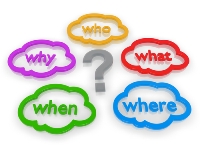
No plan is viable without some form of research. Especially if you require outside investment you will need to demonstrate you have done a hotel market study for your new hotel concept. It will also be helpful for you to put your ideas on paper and benchmark them against the market to determine the chance of success. Based on our hotel management company´s experience we have put some pointers on paper …
Having opened various hotels we have noticed that many entrepreneurs make decisions based on assumptions when it comes to their new hotel concept. This could be very dangerous as any unforeseen change you might have to implement at a later stage due to a false assumption could bring with it additional costs that will have a negative impact on your bottom line.
Especially if you have raised capital investment from banks or other lenders, this puts you in a difficult predicament, as it might not be possible to pay off loans in the time frames agreed, or ROI will not reach the expected levels. Pressure will subsequently mount to make other changes to your concept to recuperate and offset the additional costs. Such changes might even affect the uniqueness of your original concept, but you will have no choice but to compromise and please investors.
A typical example we face is that operators would like to save on staffing costs by selling rooms at rates including breakfast. Offering room-only prices does not fit in their cost structure and PnL forecast, as staffing numbers need to be kept low. However we studied the market we uncover that all competitors offer room-only rates, especially in city destinations. This would put a hotel at a significant disadvantage, and make the hotel less competitive as price is among the key selection factors by consumers.
The assumption to simplify operations and include breakfast in the room price in order to save on operational costs is understandable. But you have to ensure that it is sustainable from a commercial perspective as well and benchmark your idea against the market.
Another classic example is hotel companies that want to enter the market with a flat rate structure. In essence from a positioning perspective, it sounds great. You will attract a lot of consumer attention by offering such transparency. However in reality, as hotel markets are driven mostly by dynamic rates which fluctuate with demand (a bit like the stock market), you will find your hotel out-priced by competitors in low season
So, how to prepare and avoid these kinds of situations? You will have to do thorough market research and perform a hotel market analysis.
Market Performance Let’s start with a generic market study. You need to obtain statistics on occupancy, average rate, and revenues of the surrounding area of your hotel. If you get data for the last few years of similar hotels in your market you will get a good idea of how the market is evolving, giving you a rough perspective of what kind of overall results would be possible.
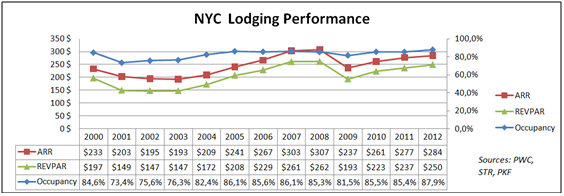
Business Sources What creates demand in your market? Why do travelers come to your destination? What is the motive for their trip? Where are they coming from, or rather, what are your feeder markets? These are all questions that need to be answered. Your local tourist organization or hotel marketing agency will probably be able to provide you with valuable market statistics. But also go on the website of nearby airports, it will provide you with interesting statistics in terms of passenger data. You need to understand your sources of business and market segments to be able to make an effective marketing plan.
Competitive Analysis Next step, you need to make a detailed overview of your competition. We differentiate competitors into 2 groups. First, we look at conceptual competitors that have a concept that is similar or comparable to yours in essence. And second, there are proximity competitors that are in your immediate surroundings and this will be your local competition.
Start with building a summary outlining in detail:
- concept type
- number of rooms
- star rating
- chain affiliation
- all facilities
- website URL
- website languages
- website versions (desktop, mobile, tablet)
- online reputation and review scores
- price range and average rate (see Google Hotel Finder and TripAdvisor)
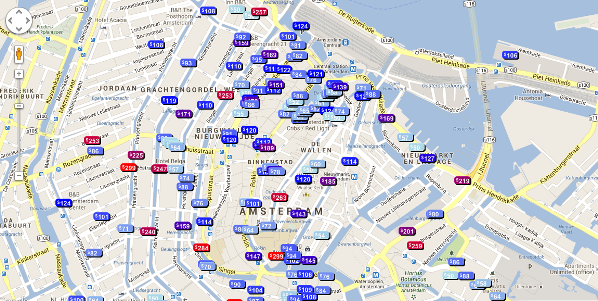
Add notes with anything that is unique about their operations, or service that differentiates them from the rest. It will help you at a later stage in defining a competitive strategy.
It would be good if you can get monthly performance data on the individual hotels as well. You will gain a valuable understanding of the seasonal fluctuations of the market.
Development Pipeline What other hotels are planned to be constructed and open in your immediate area? How many rooms will be added? How will this impact your market share and financial results?
These are all very relevant questions that cannot be ignored. And investors will be extremely interested. Mind you, if an area is popular and many new hotels are planned it can have a positive effect as well, and increase overall demand.
Maximize Your Hotel Revenue
Uncover the hidden revenue potential of your hotel or resort.

Profit & Loss Statement
The key question as always is how much money will your hotel make. Investors are logically keen to know what kind of return on investment to expect. Based on your market research and competitive analysis you will need to make a founded estimation of what kind of occupancy and average room rate your new hotel can generate. You will need to make a 5-year forecast.
I would advise being prudent and conservative, or rather being realistic and honest. Don’t put numbers on paper that investors would like to see, but make an achievable forecast. Add revenue and cost predictions from all operational departments (restaurant, bar, banquets, front office, housekeeping, engineering, etc …) to get to your GOP (gross operating profit).
Include the undistributed, fixed, and overhead costs to get to your NOI (net operating income) or EBITDA (Earnings Before Interest Taxes Depreciation). This is basically the profit generated from the hotel’s own operations.
To estimate costs you can use local industry standards as a benchmark. I would recommend creating a staffing schedule for each department to simulate your cost and ensure you are at the right level. You can’t afford big mistakes, as your profit would change radically and you would not be able to achieve the ROI you sold to investors.
Doing this exercise yourself is a great experience to validate your plan. I highly recommend doing this thoroughly (in-house) and spending significant time on, it before even going to an accredited hotel consulting agency to get an official feasibility study for investors. Lenders will require this of course as a part of their goal to limit their exposure to risk, but you should do your own homework upfront.
Hope you enjoyed the article. Look forward to your feedback and suggestions in the comments section below.
RELATED ARTICLES:
- How to Start your Own Hotel
- Innovative Hotel Concepts
- Hotel Business Plan
- Hotel Feasibility Study
Subscribe Latest Articles
Share This Story, Choose Your Platform!
About the author:.
Related Posts

Top Revenue Management Strategies for Hotels
What is hotel management, hotel budget plan: are you ready for 2024, what does a hotel management company do.

Daniel Diosi
Why is market research for hotels essential to create a successful marketing strategy?

Type your email…
Independent hotels, in hardly any case, do market research. Meanwhile, international chains and hotel brands do it quite commonly.
- Pre-opening
- In case of seriously bad performance
Why is market research important for hotels and resorts?
As the business environment changes, hotel brands need to adapt to remain relevant and attractive to potential guests. Failing to adapt to market trends and customer expectations carries the risk of starting a downward spiral, where the hotel needs to reduce rates to maintain occupancy.
Long-term business success, brand popularity, and marketing effectiveness ultimately depend on how relevant a hotel can remain to travelers visiting the destination. Regular market research is the only way to acquire adequate information to evolve a hotel product and maintain optimal marketing and brand communication.
Why do most independent hotel brands not engage in regular market research?
- Lack of budget allocated for business intelligence
- Lack of market research skills and expertise within the hotel team
- Lack of awareness of how important market research is
- The management sees it as a cost rather than an investment
In most cases, independent hotel management teams are too focused on monthly goals and maintaining a month-to-month ROI. Investing even in relatively inexpensive $5,000 market research would disrupt their regular marketing spend. Market research does not generate a quick return on investment (ROI), which makes it an unattractive investment for owners and stakeholders.
What insights can hotels get from market research? How can it improve the overall business?
For existing hotels, market research enables to find attributes that make the brand successful, identify risks with products, and expose holes in competitor’s product offerings. A throughout market research can provide fresh and focused information about consumer demands, expectations, and most importantly how your potential guests see your hotel brand at the time of the research. These are the key insights market research can get for products already on the market.
For hotels and resorts in the pre-opening stage, market research is typically carried out to:
- Study the industry as it exists in the present, and identify the direction where it is headed
- Identify any dynamics that may affect your business, especially those beyond direct competitors and the industry. Study market shifts and disruptions that may impact your business.
- Identify the questions that need to be asked or the issues that need to be monitored. Identify opportunities and potential threats.
- Create a baseline for future strategy.
How to use market research insights to develop a successful brand and marketing strategy?
Hotel management teams typically rely on freely available secondary research and internal data when conducting market research. Collecting information on an informal basis about the marketplace and their competitors is common and are often done in an unstructured way by someone who does not know much about market research methodologies.
Such low-quality business intelligence fails when it comes to assessing the opportunities and risks of a new, or a changing market. This can be catastrophic to your business.
Asking the right questions
The industry-standard way to use market research starts by asking relevant questions, identifying known and unknown business risks, and finding focused answers.
Quite often, professionals without skills identify problems incorrectly, which leads to solutions that do not solve any underlying issues.
To demonstrate the importance of asking the right questions, I will share a short story.
One particular example is a cruise line company we used to work with. Their sales started to drop dramatically in 2018, right after they launched large-scale digital marketing campaigns, allocating the majority of their marketing and advertising budget online.
They did a number of customer-insight surveys to assess what their customers like or dislike about their cruising experience and made sure that all the key positive points will be highlighted in their campaigns.
Their campaigns did turn out well, so they contacted us to investigate the problem. Initially, they blamed the marketing agency and suspected that the sharing economy might be the reason for their issues.
A simple internal research highlighted that the majority (over 60%) of the customer base of this luxury cruise line company was aged 70 years old above, and their brand was relatively unknown for younger generations.
Their customer base was not using social media, either YouTube, so their previous demographics were no longer reached efficiently.
The new segments they were targeting did not react well to their marketing campaign, as the aspects 70+ old people liked about a cruise line experience were not the same as young travelers would expect.
Identifying information sources for secondary research
The majority of (un)professional hotel marketing consulting companies base their market research on secondary information. There are plenty of market and industry reports available at relatively affordable prices. These cover travel trends, consumer insights, and practically everything that can help to get information about what’s happening on the market.
For professional market research companies, secondary research is only a starting point. The available information helps to frame the scope of the primary research and to identify questions that will answer business problems.
In the hospitality industry, market research typically ends by reading a few blog posts on PhocusWire and hotel blogs or purchasing a $20 market report from a few years back.
The problem is that travel and tourism are both fast-paced industries and data loses its relevance quickly. For secondary research, always use the latest available information from credible sources.
Remember, secondary research is only to give a basic understanding of the market, your findings and plans need to be validated by primary market research.
Conducting a primary research
Let’s address the elephant in the room. Most independent hotels hesitate to invest in primary market research because it is costly and will not generate an ROI. Instead, they will develop marketing strategies based on secondary research and “expert opinions”, which equals assumptions.
Doing primary research for a market research project does not need to be expensive. Collecting a few thousand relevant answers from each target segment can be sufficient to validate ideas and concepts – or prove those wrong.
Proving strategic concepts wrong is probably not an outcome one would expect from market research. However, accepting that the initial concepts would not have worked out well is a sure way to avoid business failure.
Market research, even at a small scale can help significantly to develop better marketing strategies.
Given that most hotel marketing professionals do not have sufficient research skills, and the management teams have the tendency to base strategies on assumptions, market research is a great investment for any brand that wants to get ahead of its competitive set.
Share this:
- Click to share on Twitter (Opens in new window)
- Click to share on Facebook (Opens in new window)
Discover more from Daniel Diosi & Partners
Subscribe now to keep reading and get access to the full archive.
Continue reading
You are using an outdated browser. Please upgrade your browser to improve your experience.
Market Research Consumer Goods Market Research Travel & Leisure Market Research Travel Services Market Research Hotels & Lodging Market Research
Hotels & Lodging Market Research Reports & Industry Analysis
Hotels & lodging industry research & market reports, refine your search, casinos (except casino hotels) (u.s.): analytics, extensive financial benchmarks, metrics and revenue forecasts to 2030, naic 713210.
Apr 22, 2024 | Published by: Plunkett Research, Ltd. | USD 2,495
... Its Industry, and Revenue Forecasts to 2030, NAIC 713210 Vital industry-specific data including metrics, benchmarks, historic numbers, growth rates and forecasts that will save countless hours of research. Key Findings: Casinos (Except Casino Hotels) Industry ... Read More
Casino Hotels and Casino Resorts (U.S.): Analytics, Extensive Financial Benchmarks, Metrics and Revenue Forecasts to 2030, NAIC 721120
... Companies Within Its Industry, and Revenue Forecasts to 2030, NAIC 721120 Vital industry-specific data including metrics, benchmarks, historic numbers, growth rates and forecasts that will save countless hours of research. Key Findings: Casino Hotels and ... Read More
Hospitality, Restaurants, Hotels, Bars and Food Service (U.S.): Analytics, Extensive Financial Benchmarks, Metrics and Revenue Forecasts to 2030, NAIC 720000
... Against Averages and Top Companies Within Its Industry, and Revenue Forecasts to 2030, NAIC 720000 Vital industry-specific data including metrics, benchmarks, historic numbers, growth rates and forecasts that will save countless hours of research. Key ... Read More
Hotels, Motels, Inns, Resorts and Lodging (U.S.): Analytics, Extensive Financial Benchmarks, Metrics and Revenue Forecasts to 2030, NAIC 721000
... and Top Companies Within Its Industry, and Revenue Forecasts to 2030, NAIC 721000 Vital industry-specific data including metrics, benchmarks, historic numbers, growth rates and forecasts that will save countless hours of research. Key Findings: Hotels, ... Read More
Hotels, Motels, Inns and Resorts (Lodging and Hospitality, Including Casino Hotels) (U.S.): Analytics, Extensive Financial Benchmarks, Metrics and Revenue Forecasts to 2030, NAIC 721100
... Hotels) Industry (U.S.): Analytics, Extensive Financial Metrics, Benchmarks Against Averages and Top Companies Within Its Industry, and Revenue Forecasts to 2030, NAIC 721100 Vital industry-specific data including metrics, benchmarks, historic numbers, growth rates and forecasts ... Read More
Hotels, Motels, Inns and Resorts (Lodging and Hospitality) (U.S.): Analytics, Extensive Financial Benchmarks, Metrics and Revenue Forecasts to 2030, NAIC 721110
... Metrics, Benchmarks Against Averages and Top Companies Within Its Industry, and Revenue Forecasts to 2030, NAIC 721110 Vital industry-specific data including metrics, benchmarks, historic numbers, growth rates and forecasts that will save countless hours of ... Read More
Travel Agencies and Room or Accommodation Sharing Services (U.S.): Analytics, Extensive Financial Benchmarks, Metrics and Revenue Forecasts to 2030, NAIC 561510
Apr 20, 2024 | Published by: Plunkett Research, Ltd. | USD 2,495
... Metrics, Benchmarks Against Averages and Top Companies Within Its Industry, and Revenue Forecasts to 2030, NAIC 561510 Vital industry-specific data including metrics, benchmarks, historic numbers, growth rates and forecasts that will save countless hours of ... Read More
Hotel & Hospitality Management Software Market by Product (Booking & Reservation Software, Customer Relationship Management Software, Event Management Software), Deployment (On-Cloud, On-Premises), Organization Size, End-User - Global Forecast 2024-2030
Apr 17, 2024 | Published by: 360iResearch | USD 4,749
... Software Market size was estimated at USD 6.63 billion in 2023 and expected to reach USD 7.06 billion in 2024, at a CAGR 6.83% to reach USD 10.54 billion by 2030 . Hotel & hospitality ... Read More
Hotel Property Management Software Market by Function (Booking Engine, Channel Management, Lease Management), Type (Homestay Accommodation, Hotels & Resorts, Lifestyle Villages), Deployment, End User - Global Forecast 2024-2030
... size was estimated at USD 7.15 billion in 2023 and expected to reach USD 7.91 billion in 2024, at a CAGR 10.84% to reach USD 14.71 billion by 2030. The hotel property management software (HPMS) ... Read More
Bed & Breakfast Inns
Apr 15, 2024 | Published by: First Research, Inc. | USD 129
... No major companies operate in the industry. COMPETITIVE LANDSCAPE Demand is driven by personal disposable income. The profitability of individual establishments depends on occupancy rate and operational efficiency. Larger B&Bs may have advantages in providing ... Read More
Public Relation Robots Market by Product (Telepresence public relation robots, Humanoid public relation robots, and Others), End User (Hotels and restaurants, Mobile guidance and information, Media relation robots, and Others), and Region 2024-2032
Apr 08, 2024 | Published by: IMARC Services Pvt. Ltd. | USD 3,899
... global public relation robots market size reached US$ 6.4 Billion in 2023. Looking forward, IMARC Group expects the market to reach US$ 13.2 Billion by 2032, exhibiting a growth rate (CAGR) of 8.12% during 2024-2032. ... Read More
U.S. Counter Mounted Automatic Soap Dispenser Market - Focused Insights 2024-2029
Apr 08, 2024 | Published by: Arizton Advisory and Intelligence | USD 1,800
... Estate & Hospitality Industry: The commercial real estate & hospitality industry is growing significantly in the U.S. market for various reasons, including rising office construction, growing healthcare facilities, growing tourism, design trends, and emphasis on ... Read More
Near Field Communication (NFC) Market Report by Offering (Non-Auxiliary Products, Auxiliary Products, Software), Operating Mode (Read and Write Mode, Peer-To-Peer Mode, Card Emulation Mode), End User (Retail, Transportation, Automotive, Residential and Commercial, Medical and Healthcare, Consumer Electronics, Banking and Finance, Hospitality, and Others), and Region 2024-2032
... Healthcare, Consumer Electronics, Banking and Finance, Hospitality, and Others), and Region 2024-2032 The global near field communication (NFC) market size reached US$ 24.0 Billion in 2023. Looking forward, IMARC Group expects the market to reach ... Read More
2024 Hotel and Hospitality Housekeeping Services Global Market Size & Growth Report with Updated Recession Risk Impact
Apr 05, 2024 | Published by: Kentley Insights | USD 295
... revenue, growth, and share across 4 global regions (The Americas, Europe, Asia & Oceania, Africa & Middle East), 22 subregions, and 195 countries. Figures are from 2012 through 2023, with forecasts for 2024 and 2028. ... Read More
2024 Room Or Unit Accommodation for Travelers Global Market Size & Growth Report with Updated Recession Risk Impact
... market size, revenue, growth, and share across 4 global regions (The Americas, Europe, Asia & Oceania, Africa & Middle East), 22 subregions, and 195 countries. Figures are from 2012 through 2023, with forecasts for 2024 ... Read More
2024 Room Or Unit Accommodation for Travelers Without Maid Service Global Market Size & Growth Report with Updated Recession Risk Impact
... Market Size & Growth Report covers market size, revenue, growth, and share across 4 global regions (The Americas, Europe, Asia & Oceania, Africa & Middle East), 22 subregions, and 195 countries. Figures are from 2012 ... Read More
2024 Overnight Recreational Camp Accommodation Global Market Size & Growth Report with Updated Recession Risk Impact
... and share across 4 global regions (The Americas, Europe, Asia & Oceania, Africa & Middle East), 22 subregions, and 195 countries. Figures are from 2012 through 2023, with forecasts for 2024 and 2028. The historical ... Read More
2024 International Customized Tours with Accommodation Global Market Size & Growth Report with Updated Recession Risk Impact
2024 customized tours with accommodation global market size & growth report with updated recession risk impact, 2024 architectural services for hotels and convention centers global market size & growth report with updated recession risk impact.
... Report covers market size, revenue, growth, and share across 4 global regions (The Americas, Europe, Asia & Oceania, Africa & Middle East), 22 subregions, and 195 countries. Figures are from 2012 through 2023, with forecasts ... Read More
2024 Domestic Customized Tours with Accommodation Global Market Size & Growth Report with Updated Recession Risk Impact
2024 lodging reservation service global market size & growth report with updated recession risk impact.
... across 4 global regions (The Americas, Europe, Asia & Oceania, Africa & Middle East), 22 subregions, and 195 countries. Figures are from 2012 through 2023, with forecasts for 2024 and 2028. The historical data utilizes ... Read More
2024 Room Or Unit Accommodation for Travelers with Maid Service Global Market Size & Growth Report with Updated Recession Risk Impact
2024 shared-room accommodation for travelers global market size & growth report with updated recession risk impact, hotels and resorts in australia - industry market research report.
Apr 05, 2024 | Published by: IBISWorld | USD 785
... and resorts also earn income by providing food and beverage options for guests. This report covers the scope, size, disposition and growth of the industry including the key sensitivities and success factors. Also included are ... Read More
< prev 1 2 3 4 5 6 7 8 9 10 next >
Filter your search
- Africa (99)
- Caribbean (5)
- Central America (4)
- Europe (416)
- Global (633)
- Middle East (112)
- North America (281)
- Oceania (76)
- South America (108)
Research Assistance

Join Alert Me Now!
Start new browse.
- Consumer Goods
- Food & Beverage
- Heavy Industry
- Life Sciences
- Marketing & Market Research
- Public Sector
- Service Industries
- Technology & Media
- Company Reports
- Reports by Country
- View all Market Areas
- View all Publishers

99 Market Research Questions You Should Be Asking

Asking the right market research questions at the right time can pay dividends. You wouldn’t buy a house without first researching the neighborhood – and it’s unlikely you’d take a job without doing your homework on your prospective employer. So why should starting a business be any different?
Whichever way you look at it, asking the right market research questions makes sense as a first step.
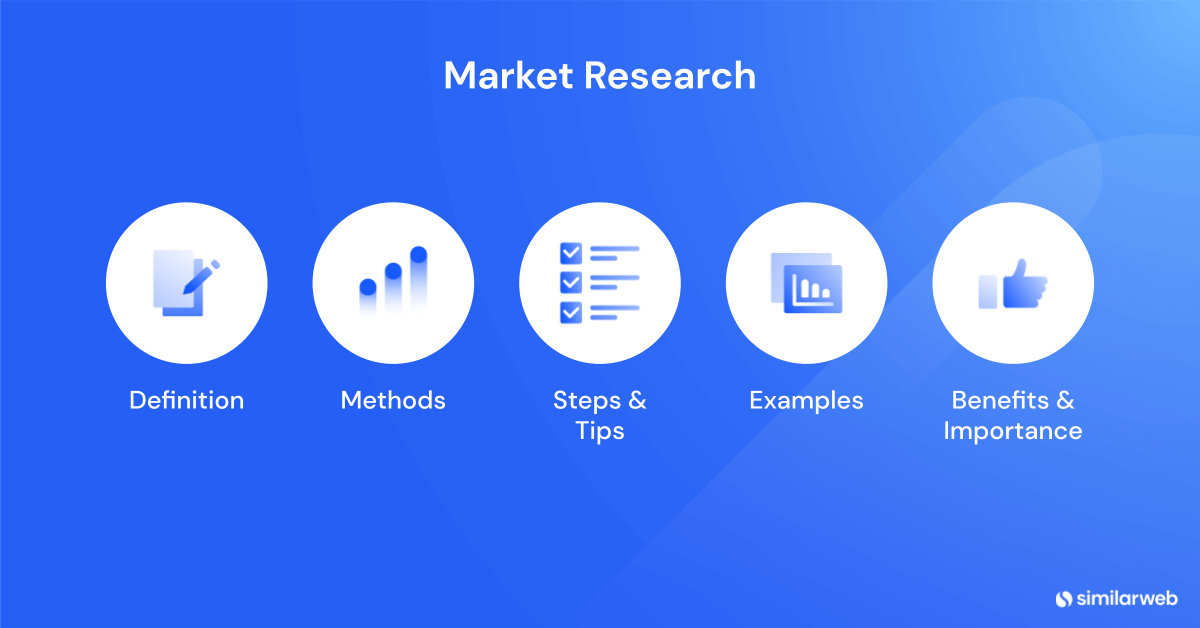
Do you want to gain a foothold in the market? Get to grips with the competition? Start thinking like your target audience? Introduce a new product or mobile app?
Whatever your goal, market research will help you understand all aspects of your industry, brand, potential customers, and rivals – good market questions can make a world of difference.
Below, we’ll walk you through 99 questions to ask for market research to succeed in the digital world. We started out as a research intelligence tool , so we know our stuff when it comes to defining a market, mapping key players, marketing strategies , and understanding trends , and target audiences.
So read on for all the questions your market research strategy needs – and how Similarweb can help you answer them.
How to choose market research questions
The market research questions you pick will depend on where your business is in its lifecycle. As we’ll get to in a moment, there are a lot of market research questions – so how exactly do you choose?
Pre-start-up – If you’ve not launched a business yet, and are just cultivating an idea – you’ll want to start with some formal market research first. Then, ask more general market research questions, and some targeted at start-ups. This will help you determine if there’s a financially viable market, whether it has blockbuster prospects, or is better off left in the cutting room.
Early start-up – If you’ve just started out, you’ll want to reach out to your target market with survey questions to help you tailor your products and services to them.
Established – If you’ve been around a little longer – and already have a few current customers – you’ll want to learn more about how you can keep improving your customer experience.
Finally, you can look at questions to ask for market research that focus on competitor analysis. These aren’t limited to any particular stage of your business’s journey. After all, getting clued up on the competitive landscape is always handy – whether you’ve just entered the market or are one of its most established players.

99 market research questions: discover, define, drill down
There’s no need to limit yourself! The best types of market research should – and do – include general questions and those addressing both existing and prospective customers. Indeed, an intelligent approach to market research should cover demographic questions all the way to those that’ll help you plan a product launch , drill down into your target market , and get the jump on your competitors.
Read on to see the best examples of market research questions in action!
Generic market research questions
These questions are most useful at the planning stage. They can apply to all businesses at any stage because markets shift, along with consumer behaviors, needs, and demands.
General market research is the process of figuring out how rich the soil is and whether the conditions are optimal to allow your business’s roots to take hold.
Some general market research questions you should be asking include:
1. How large is my product’s total addressable market (TAM)? 2. Will this market hold firm, or will it grow or decrease with time? 3. Are there already similar products or services out there? 4. If so, who’s offering them? (see the competitor analysis questions below for more) 5. Who are my buyer personas ? 6. What pain points does my product address? 7. How much market share is available for my business to take? 8. What external factors might affect the health and viability of my chosen market? 9. Which website demographics will I target? 10. Will I market my product internationally or target a specific geographical location or a single location (if so, why?) 11. Do I need to consider a website alone, or should I invest in a mobile app? (use mobile app intelligence to help to figure this one out) 12. Which suppliers or manufacturers operate in the space, and are they reputable? 13. Which marketing channels will I prioritize, and which affiliates or advertisers could I look to in order to expand my reach?
Market research questions for start-ups
Regardless of your sector, there are key things you need to establish before setting up a business. Read on to discover the fifteen market research questions all start-ups need to ask.
14. What is the total addressable market (tam), serviceable available market (sam), and share of market (som)? 15. What are the latest (and predicted) trends impacting your market? 16. Do you know who your direct and indirect competitors are?
Read through questions 71-99 for examples of market research questions to help you with this.
17. What’s your USP in the market? What’s the value-add that’ll make you stand out? 18. What do your competitors charge, and will you charge the same, more, or less?
You’ll also need to consider pricing models. For instance, pay-monthly, annual subscription, or other?
19. Do you know how much people are willing to pay for a product/service like yours? 20. Can you trial your product or service with a beta group before launch to get feedback and/or testimonials? 21. What are the most effective marketing channels for businesses like yours? 22. How active are your customers and competitors on social media? 23. How will you onboard/welcome new customers? 24. Do rivals offer new customer or loyalty discounts? 25. What kind of customer support will you offer? Look at your rival’s offerings and decide whether you want to stick with the same or do better. 26. Are potential customers driven by price, product, or service? 27. Are your competitors or market impacted by seasonal trends ? 28. What opening hours and service level agreements (SLAs) will you advertise on your site?
Market research questions for a new product
Whether established, pre-launch or newly set up, you may need to ask specific market research questions for a new product launch. Whether you simply want to test the water with an idea or concept or go a little deeper to get clearer insights, these questions will help.
29. Is there a specific pain point your product will address? (if you have already identified an ideal customer, what kinds of things do they struggle with?) 30. Is there a demand for your product in the market? 31. Are there any opportunities to partner with other companies to get referrals for your product? 32. How do you plan to market and launch your product? 33. Will you release a minimum viable product (MVP) to market first?
If you release an MVP or offer a free trial to a select group of people, you’ll need to follow this up with a survey or specific questions to get feedback around usage, benefits, and improvements. A few examples of market research questions like these could include:
34. Which feature of the product did you use the most? 35. What improvements would you like to see? 36. How much would you be willing to pay for this product? 37. Was the product easy to use? 38. Was there anything you experienced during the trial that may deter you from using our product in the future? 39. How often did you use the product? 40. Would you recommend this product to someone else? If yes, why? If no, why?
Market research questions for your target audience
Once you’re sure there’s a viable market for your business, it’s time to drill down into that market – your audience and website demographics .
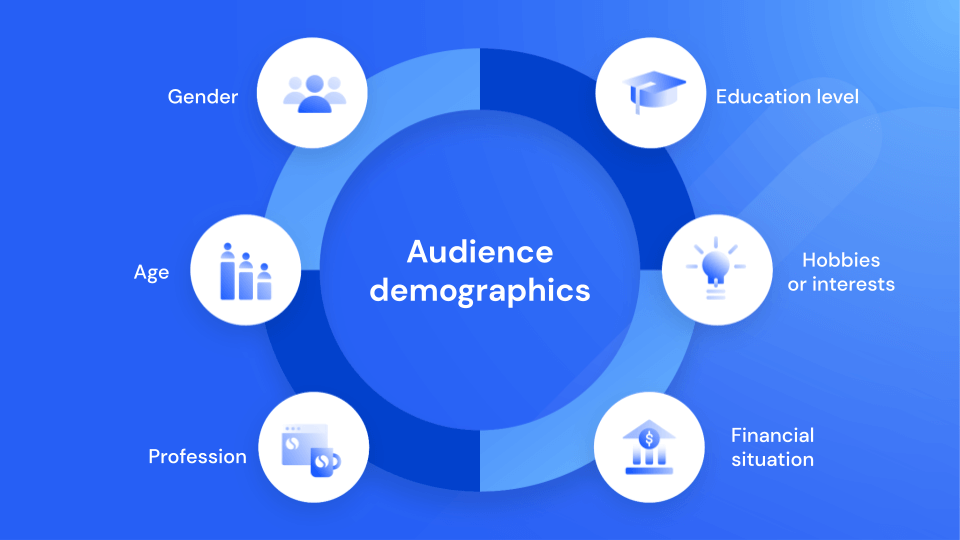
To begin, you’ll want to ask your respondents a few demographic questions to understand the basics. These might include:
41. How old are you? 42. Which gender do you identify as (if any)? 43. What’s your level of education? 44. What’s your profession? 45. What’s your household size? 46. What is your household income? 47. Which ethnic/cultural group do you identify with? 48. Where do you live? 49. Do you have any dependents? 50. What are your hobbies?
These questions provide a top-level understanding of your target audience . So, you can then utilize psychographic segmentation to dig a little deeper. These inquiries are designed to draw out your customers’ attitudes, lifestyles, likes, dislikes, motivations, and beliefs – particularly if they relate to your product or service.
The goal? To match your business with its ideal customer . Examples of these types of market research questions include:
51. Do you actively seek out new experiences or prefer to stick with what you know? 52. What do you most enjoy doing in your free time? 53. What was the last big-ticket item you purchased? 54. Have you ever boycotted a brand? If so, which brand – and why? 55. Which matters more when you make a purchase – price or quality? 56. Would you rather have more time or money? 57. How do you like to make purchases – do you prefer apps or web-based services? 58. How do you prefer to seek customer support? 59. What’s your main source of information?
For a more detailed deep dive into the above, see our guide on the what and why of market segmentation – and how to become a pro at it!
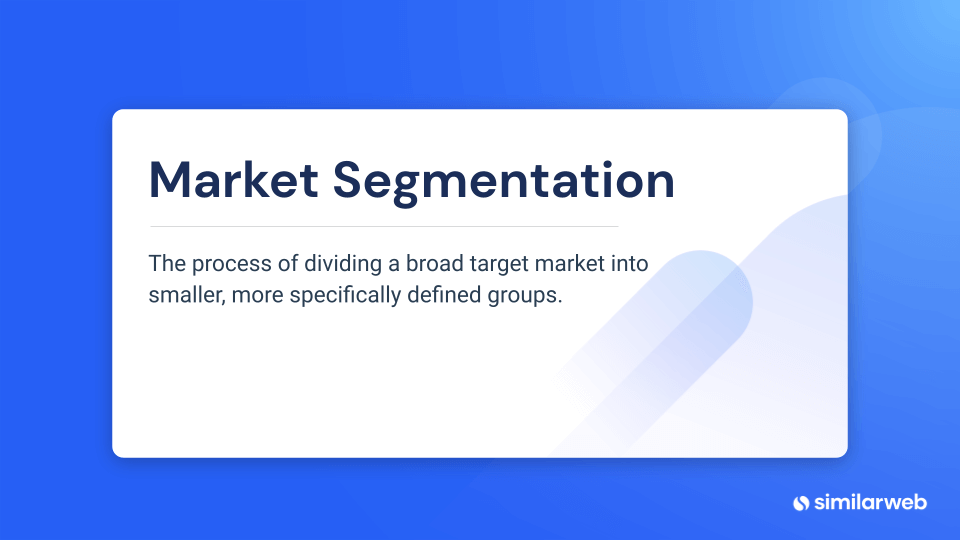
Market research questions for your customers
So, you’ve established the market for your product, nailed your target audience, and now… you’ve got customers! Congrats – that’s a surefire sign that you’re on the right track.
But simply having new customers isn’t enough. To be truly successful, you’ll need to maintain engagement , foster loyalty to your product, and keep your customers coming back for more – in other words, build your brand.
Fortunately, this is where market research can help. By asking your existing customers a few questions, you can find out what you’re doing well, what you could be doing better, and – crucially – what your brand means to them. With this knowledge, you can do more of what your customers love, and identify key areas for improvement.
Here are some of the market research questions you can ask your customers to get useful feedback:
60. How did you first hear about our brand? 61. What made you choose us? 62. How long have you been a customer? 63. How would you rate your most recent experience with us? 64. Did we answer all your questions and requests for support? 65. Would you use us again? 66. How likely are you to recommend us to a friend? 67. What do you wish our product could do? 68. Do you believe our product is priced fairly? 69. What’s the maximum you’d pay for this kind of product? 70. What do you like most about our product?
Explore our complete guide to audience development for more tips, tricks, and strategies around this type of customer analysis.
Market research questions for competitor analysis
Death, taxes, and… competition .
Yep – no matter how original or innovative your idea is, pretty soon, there’ll be hordes of wannabes targeting the same space with similar products, and guess who they’ll be targetting? Your customers.
So how do you keep your friends close and your competition even closer?
Well, a SWOT analysis is a good place to start. It involves swotting up on your business’s strengths, weaknesses, opportunities, and threats. It’s a heady mix of evaluating your business and the external factors that could affect it. So it’s naturally a great place to get your competitor analysis and benchmarking off the mark.
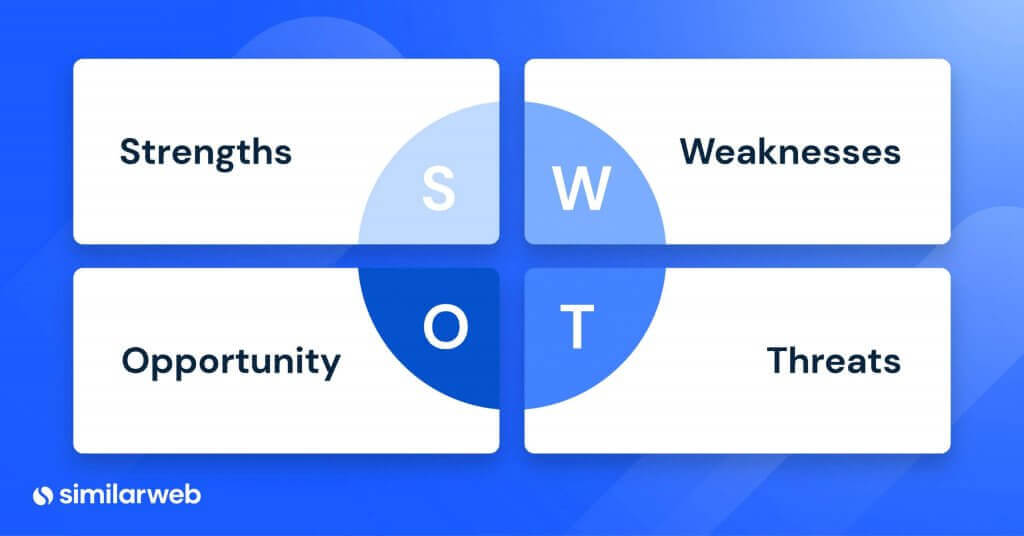
You could also begin by asking yourself the following market research questions:
71. Who are our main competitors? 72. What are they doing that we’re not? 73. What’s our unique value proposition? 74. How much web traffic do our competitors receive? 75. Do they have a mobile app? If so, is it on iOS or android? How many monthly or daily active users do they have? 76. What’s their bounce rate ? 77. Which keywords and search terms do they target? 78. Which marketing channels do they prioritize, and how frequently do they advertise? 79. How do the backlink profiles of our competitors compare to our own? 80. Are our competitors seen as more authoritative in the space? 81. What kind of content do our competitors produce? 82. How do our competitors attract customers? 83. What are the unique selling points of our competitors? 84. What do our competitors charge? 85. What social media channels do our competitors use? 86. What kind of discounts and promotions do our competitors run? 87. Which sources and affiliates drive traffic to our competitors’ sites? 88. How does our business model compare to those of our rivals?
Remember, your customers are a potential goldmine of information about your competitors . Reach out to your client base with the following market research questions:
89. Who do you seek advice from when shopping for this kind of product? 90. Are you loyal to a particular brand in the space? 91. If so, what do you love most about this brand? 92. Is there anything that this brand could do better? 93. How did you find the last product you bought in the industry? 94. Is there anything you see our competitors doing that you’d like us to do? 95. What’s most likely to make you buy a product from another brand? 98. Can you tell us the top three things that made you choose us over a competitor? 99. What one thing matters most to you when deciding between brands that offer the same product?
You may also consider including some open-ended questions so you can hear from your loyal customers in their own words. Market research surveys are a great way to uncover and collect this type of data.
If you’re unsure where to start, learn about the seven types of competitor analysis frameworks – and how to use them to get your strategy off the ground.
Similarweb Competitor Analysis Frameworks
Whether you're B2B or B2C, get started with our free and easy to use template
How to answer these questions with Similarweb
Now that you’re armed with the 99 research questions you need to succeed in your market research endeavors, how do you answer them?
Similarweb Digital Research Intelligence is a great place to start. With these tools (which you can try for free) you can effortlessly do market sizing, gauge your audience’s loyalty and engagement rate , uncover mobile app intelligence for your market, improve your site’s retention rates, and more.
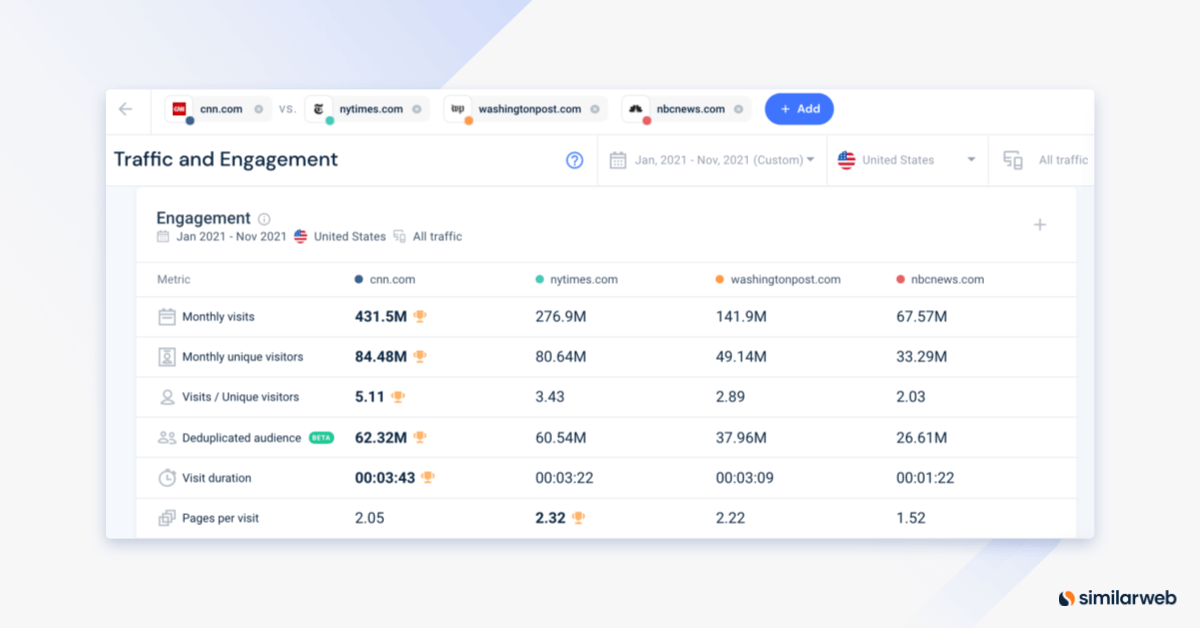
In the same vein, Similarweb can also help you conduct that all-important competitor analysis . You can build a picture of which rival sites your customers frequent and form a data-driven understanding of why.
With Similarweb Digital Research Intelligence, you get an entire suite of market research and analysis tools at your fingertips. You can monitor your industry in real time via a personalized dashboard with on-demand access to industry, company, and consumer trends. With a broad view across web and mobile app intelligence, you can clearly understand the digital landscape that matters to you ( and your customers ) most.
Don’t just take our word for it, though. Check out what Similarweb can do for you today, and start tackling those big questions now!
Level up your market research
Get the data you need to adapt to market changes and industry trends.
What is market research?
Market research assesses the viability of a product or service by reaching out to its target market. It can include primary research – such as interviews, focus groups, and questionnaires – and secondary research , like articles and white papers.
What is the best way to ask market research questions to customers?
Because they’re quick to set up, relatively low-cost, and easy to use, market research surveys are a great tool to use if you want to ask a group of people market research questions.
What’s the difference between qualitative and quantitative market research?
While qualitative data is typically mined through close observation with participants – such as in focus groups or face-to-face interviews – quantitative processes tend to involve larger-scale data grabbing. This could use forms, surveys, polls, or questionnaires to collect opinions en masse, often via emails or social media.
Qualitative data captures people’s thoughts and feelings – the prevailing sentiment around a product or service. Its quantitative counterpart, however, is more concerned with the cold, hard facts. That could be traffic metrics, engagement levels, bounce rates: anything that paints a data-driven picture!
Related Posts

How to Conduct a Social Media Competitor Analysis: 5 Quick Steps

Most Popular Messaging Apps Worldwide 2023

Market Sizing: Measuring Your TAM, SAM, and SOM

How to Research a Company: The Ultimate Guide

How To Create Better Competitive Analysis Reports
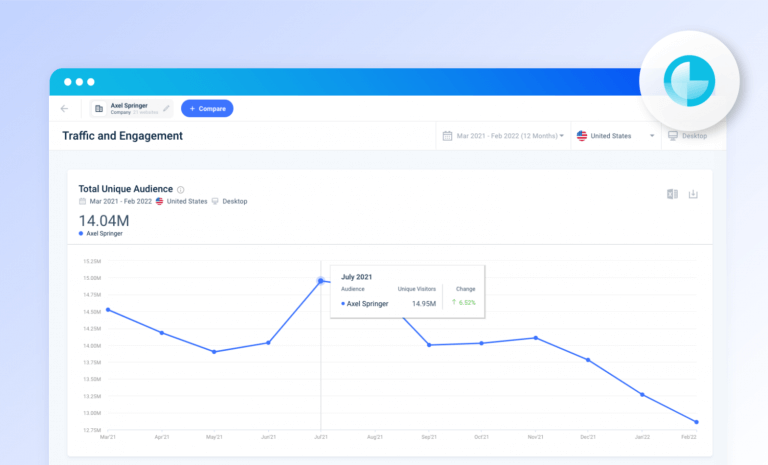
Fresh Updates: Analyze Entire Companies With Company Analysis
Wondering what similarweb can do for you.
Here are two ways you can get started with Similarweb today!

Root out friction in every digital experience, super-charge conversion rates, and optimize digital self-service
Uncover insights from any interaction, deliver AI-powered agent coaching, and reduce cost to serve
Increase revenue and loyalty with real-time insights and recommendations delivered to teams on the ground
Know how your people feel and empower managers to improve employee engagement, productivity, and retention
Take action in the moments that matter most along the employee journey and drive bottom line growth
Whatever they’re are saying, wherever they’re saying it, know exactly what’s going on with your people
Get faster, richer insights with qual and quant tools that make powerful market research available to everyone
Run concept tests, pricing studies, prototyping + more with fast, powerful studies designed by UX research experts
Track your brand performance 24/7 and act quickly to respond to opportunities and challenges in your market
Explore the platform powering Experience Management
- Free Account
- For Digital
- For Customer Care
- For Human Resources
- For Researchers
- Financial Services
- All Industries
Popular Use Cases
- Customer Experience
- Employee Experience
- Employee Exit Interviews
- Net Promoter Score
- Voice of Customer
- Customer Success Hub
- Product Documentation
- Training & Certification
- XM Institute
- Popular Resources
- Customer Stories
Market Research
- Artificial Intelligence
- Partnerships
- Marketplace
The annual gathering of the experience leaders at the world’s iconic brands building breakthrough business results, live in Salt Lake City.
- English/AU & NZ
- Español/Europa
- Español/América Latina
- Português Brasileiro
- REQUEST DEMO
- Experience Management
- Market Research Questions
Try Qualtrics for free
Market research questions: what to ask and how.
9 min read Whether you’re looking for customer feedback, product suggestions or brand perception in the market, the right market research questions can help you get the best insights. Learn how you can use them correctly and where to begin.
What is market research?
Market research (also called marketing research) is the action or activity of gathering information about market needs and preferences. This helps companies understand their target market — how the audience feels and behaves.
For example, this could be an online questionnaire , shared by email, which has a set of questions that ask an audience about their views. For an audience of target customers, your questions may explore their reaction to a new product that can be used as feedback into the design.
Why do market research?
When you have tangible insights on the audience’s needs, you can then take steps to meet those needs and solve problems. This mitigates the risk of an experience gap – which is what your audience expects you deliver versus what you actually deliver.
In doing this work, you can gain:
- Improved purchase levels – Sales will improve if your product or service is ticking all the right buttons for your customers.
- Improved decision making – You can avoid the risk of losing capital or time by using what your research tells you and acting with insights.
- Real connection with your target market – If you’re investing in understanding your target audience, your product and service will more likely to make an impact.
- Understand new opportunities – it might be that your research indicates a new area for your product to play within, or you find potential for a new service that wasn’t considered before.
Get started with our free survey maker
Who do you ask your questions to?
Who to target in your market research is crucial to getting the right insights and data back. If you don’t have a firm idea on who your target audiences are, then here are some questions that you can ask before you begin writing your market research questions:
- Who is our customer currently and who do we want to attract in the future?
- How do they behave with your brand?
- What do they say, do and think?
- What are their pain points, needs and wants?
- Where do they live? What is the size of our market?
- Why do they use us? Why do they use other brands?
We’ve put together some questions below (Market research questions for your demographics) if you wanted to reach out to your market for this.
With the answers, you can help you segment your customer market, understand key consumer trends , create customer personas and discover the right way to target them.
Market research goals
Give yourself the right direction to work towards.There are different kinds of market research that can happen, but to choose the right market research questions, figure out your market research goals first.
Set a SMART goal that thinks about what you want to achieve and keeps you on track. SMART stands for Specific, Measurable, Attainable, Relevant and Timely. For example, a good SMART business goal would be to increase website sales for a top product by 10% over a period of 6 months.
You may need to review some strategic business information, like customer personas and historical sales data, which can give you the foundation of knowledge (the ‘baseline’) to grow from. This, combined with your business objectives, will help you form the right SMART targets tailored to your teams.
Types of market research questions
Now that you have your SMART target, you can look at which type of market research questions will help you reach your goal. They can be split into these types:
- For demographics
- For customers
- For product
Market research questions for your demographics
Demographic information about your customers is data about gender, age, ethnicity, annual income, education and marital status. It also gives key information about their shopping habits.
Here are some questions you can ask in your market research survey:
- What is your age / gender / ethnicity / marital status?
- What is the highest level of education you have achieved?
- What is your monthly income range?
- What methods of shopping do you use?
- What amount do you spend on [product/brand/shopping] each month?
- How regular do you shop for [product/brand]?
Learn more about the demographic survey questions that yield valuable insights .
Market research questions for your customer
These questions are aimed at your customer to understand the voice of the customer — the customer marketing landscape is not an one-way dialogue for engaging prospects and your customer’s feedback is needed for the development of your products or services.
- How did we do / would you rate us?
- Why did you decide to use [product or service]?
- How does that fit your needs?
- Would you recommend us to your friends?
- Would you buy from us again?
- What could we do better?
- Why did you decide to shop elsewhere?
- In your opinion, why should customers choose us?
- How would you rate our customer experience?
Learn more about why the voice of the customer matters or try running a customer experience survey.
Market research questions for your product
These questions will help you understand how your customers perceive your product, their reactions to it and whether changes need to be made in the development cycle.
- What does our [product or service] do that you like or dislike?
- What do you think about [feature or benefit]?
- How does the product help you solve your problems?
- Which of these features will be the most valuable / useful for you?
- Is our product competitive with other similar products out there? How?
- How does the product score on [cost / service / ease of use, etc.]?
- What changes will customers likely want in the future that technology can provide?
There are also a set of questions you can ask to find out if your product pricing is set at the right mark:
- Does the product value justify the price it’s marketed at?
- Is the pricing set at the right mark?
- How much would you pay for this product?
- Is this similar to what competitors are charging?
- Do you believe the price is fair?
- Do you believe the pricing is right based on the amount of usage you’d get?
Have you tried a pricing and value research survey to see how much your target customers would be willing to pay?
Market research questions for your brand
How does the impact of your products, services and experiences impact your brand’s image? You can find out using these questions:
- What do you think about our brand?
- Have you seen any reviews about us online? What do they say?
- Have you heard about our brand from friends or family? What do they say?
- How likely are you to recommend our brand to a friend?
- Have you read the testimonials on our own channels? Did they have an impact on your decision to purchase? How?
- When you think of our brand, what do you think/ feel / want?
- How did you hear about us?
- Do you feel confident you know what our brand stands for?
- Are you aware of our [channel] account?
Learn more about brand perception surveys and how to carry them out successfully.
How to use market research questions in a survey
For the best research questionnaires, tailoring your market research questions to the goal you want will help you focus the direction of the data received.
You can get started now on your own market research questionnaire, using one of our free survey templates, when you sign up to a free Qualtrics account.
Drag-and-drop interface that requires no coding is easy-to-use, and supported by our award-winning support team.
With Qualtrics, you can distribute, and analyse surveys to find customer, employee, brand, product, and marketing research insights.
More than 11,000 brands and 99 of the top 100 business schools use Qualtrics solutions because of the freedom and power it gives them.
Get started with our free survey maker tool
Related resources
Market intelligence 10 min read, marketing insights 11 min read, ethnographic research 11 min read, qualitative vs quantitative research 13 min read, qualitative research questions 11 min read, qualitative research design 12 min read, primary vs secondary research 14 min read, request demo.
Ready to learn more about Qualtrics?
- Report Store
- AMR in News
- Press Releases
- Request for Consulting
- Our Clients

Hotels Market Size, Share, Competitive Landscape and Trend Analysis Report by Hotel Type, by Price Level and by Room Capacity : Global Opportunity Analysis and Industry Forecast, 2023-2032
CG : Hospitality
Report Code: A14388
Get Sample to Email
Thank You For Your Response !
Our Executive will get back to you soon
The hotel industry is a subset of the hospitality industry that focuses on providing lodging services to consumers. There are many different sorts of hotels, which can be classified on the basis of their size, function, service, and pricing. Limited-service, mid-range service, and full-service are the three most common levels of services. Some customers, on the other hand, may be more familiar with the star rating system, in which one is the lowest and five is the highest. Business, casino, spa, extended stay, bed & breakfast, and other categories are among the functions available. In recent years, an increasing number of individuals around the world have begun to regard travel as an essential element of their lives. Over the last five years, both leisure and corporate travel expenses have increased year over year. The hotel industry has profited from this inflow of passengers as well, with YoY growth that peaked in recent years before declining with the advent of the corona virus pandemic. The hotel sector is likely to rise in the future years as the travel and tourist industry recovers from the epidemic.
COVID-19 Impact analysis
- COVID-19 has impacted every industry throughout the world, with the hotel industry being one of the hardest effected. The epidemic has posed an unprecedented challenge to the hotel industry.
- Community lockdowns, social distancing, stay-at-home orders, travel and mobility restrictions, and other strategies to flatten the COVID-19 curve have resulted in the temporary closure of many hospitality businesses and a significant decrease in demand for businesses that were allowed to continue to operate.
- However, the reopening process has begun gradually, and authorities have begun to relax restrictions, such as allowing dine-in restaurants to reopen at a reduced capacity while adhering to rigorous social distancing norms, and progressively easing restrictions on internal and foreign travel. This will provide the market a boost in the following days.
Top Impacting Factors Inflows of international tourists and domestic tourist mobility are predicted to increase as international sporting events, trade fairs, and exhibitions become more common. This is what propels the global hotel market. Over the projection period, major factors such as improving domestic traveler buying power parity, developing airline industry, increasing foreign tourist arrivals, and loosened visa regulations would drive the Hotel Market. To increase online reservations, improve the return on advertising spend, better understand guest preferences, and build stronger customer relationships, leading hotel companies are leveraging advanced technologies such as artificial intelligence, machine learning, IoT and near-field communication, mobile payment, and data analytics. Over the forecast period, these technologies are expected to generate profitable prospects for the market. However, a dearth of rooms and high labor costs are severe concerns for the hotel business, which is already dealing with an employment shortage and finding it difficult to keep existing employees due to cheap switching costs. This could limit market expansion. Market Trends Increase in emphasize on the importance of safety
- One of the most significant trends in hotel marketing is the growing requirement to emphasize safety and hygiene in marketing content and visitor communications. Travelers, after all, require guarantees that you are concerned about the possibility of COVID and are taking precautions to keep them as safe as feasible.
- When it comes to booking decisions, hygiene and safety regulations are at the top of customers' minds, and how well you convey the efforts you've done can easily be the difference between generating sales and failing to do so. Your efforts must be publicized on your website, third-party platforms, emails, and other channels.
Increase in demand for leisure trips
- Some hotels concentrate much of their marketing efforts on business travelers, but a combination of travel restrictions, work-from-home policies, restrictions on large gatherings, and general uncertainty has resulted in the cancellation of many business events and a significant reduction in overall business travel. The pandemic, on the other hand, has taken its toll on people, and many are begging for a respite.
- As a result, while travelers may be more hesitant to travel than in the past, demand for vacations remains strong. With this in mind, hoteliers may want to consider putting a greater emphasis on leisure-based marketing communication.
Shift in Travelers from International to Local
- Another hotel trend to be aware of is a greater concentration on domestic rather than international clients. Travel restrictions imposed during the COVID crisis effected this, as they either banned travel or imposed quarantine requirements on travelers to and from specific nations.
- This could entail emphasizing various components of your hotel, such as gym facilities, Wi-Fi access, and the opportunity to work remotely from your hotel room or designated work locations. Some hotels have dabbled in services like meal delivery, and you might set yourself apart by bringing a dining experience to guests' doorsteps via additional services like Spotify.
Key Benefits of the Report
- This study presents the analytical depiction of the hotel industry along with the current trends and future estimations to determine the imminent investment pockets.
- The report presents information related to key drivers, restraints, and opportunities along with detailed analysis of the hotel market share.
- The current market is quantitatively analyzed to highlight the hotel market growth scenario.
- Porter’s five forces analysis illustrates the potency of buyers & suppliers in the market.
- The report provides a detailed hotel market analysis based on competitive intensity and how the competition will take shape in coming years
Questions answered in the Report
- Who are the leading market players active in the hotel market?
- What current trends will influence the market in the next few years?
- What are the driving factors, restraints, and opportunities in the market?
- What future projections would help in taking further strategic steps?
- What is "Hotel" Market prediction in the future?
- Which will be the niches at which players profiling with recent advancements should set a presence?
- What are the driving factors and opportunities in the market?
- What are the current trends and predicted trends?
- What are the challenges faced in the "Hotel" Market?
Hotels Market Report Highlights
Loading Table Of Content...
Enter Valid Email ID
Verification code has been sent to your email ID
By continuing, you agree to Allied Market Research Terms of Use and Privacy Policy
Advantages Of Our Secure Login

Easily Track Orders, Hassel free Access, Downloads

Get Relevent Alerts and Recommendation

Wishlist, Coupons & Manage your Subscription

Have a Referral Code?
Enter Valid Referral Code
An Email Verification Code has been sent to your email address!
Please check your inbox and, if you don't find it there, also look in your junk folder.
Hotels Market
Global Opportunity Analysis and Industry Forecast, 2023-2032

Hotel Survey Questions Examples : Everything to Know!
Directrice marketing | Le marketing et la création de contenu sont deux véritables passions pour moi!
- Customer Experience
- Employee experience
- E-reputation
- Patient experience
The tourism and hospitality industry is a growing field. More than ever, people want to escape, travel and discover the world. The customer experience, or tourist experience, in this context, is particularly important, since many players offer their services to visiting tourists: hotels, restaurants, resort activities and more!
Download now : -> FREE FRENCH EBOOK All About Customer Satisfaction and Net Promoter Score
In this article, more specifically, we will discuss the subject of customer experience in the hotel sector . How to create a memorable experience that will retain your customers? How to create a hotel questionnaire to evaluate and improve the experience lived within your establishment? Without further ado, discover our hotel survey questions and all you need to know about it!
What is a Hotel Satisfaction Survey?
Definition of a hotel satisfaction questionnaire.
A hotel satisfaction questionnaire is made up of a series of questions aimed at evaluating the tourist experience in hotels. The idea is to evaluate several areas of the stay, such as the courtesy of the staff, the cleanliness of the premises and the warm aspect of your establishment, for example! Later in this article, we will discuss in more detail the key criteria to evaluate . In addition, we will give you hotel survey questions and examples to help you!
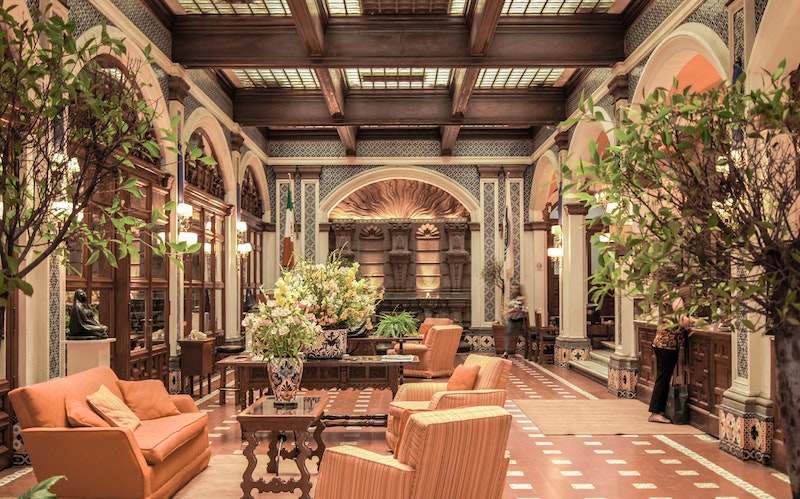
Why is it important to create hotel survey questions?

It is important to create questionnaires for hotels, since reputation in the field of tourism and hospitality is very important. This is a prestige-based field , especially because of the stars given to such establishments. The better the customer experience, the more people will want to stay at your hotel and come back again. In addition, your satisfied customers can become your ambassadors who can speak well of your establishment. Having satisfied customers will be favorable for your company’s turnover. Word of mouth is an element that should not be overlooked in terms of your hotel’s good reputation! It costs less to retain existing customers than to spend to acquire new ones. In this sense, it is worth making efforts to wow your current customers to make them come back again thanks to a successful tourist experience! Since you now know the importance of creating hotel survey questions, we will offer you a concrete example of a hotel questionnaire.

What are the components of the guest experience within a hotel?
Several elements impact the customer experience in hotels. When we talk about customer experience in this industry, we are talking about customer interactions with your business from the hotel search process to the very end of the stay. In terms of elements that impact the customer experience within hotels , we think in particular of the following aspects:
- Easy to book
- Flexible cancellation policy
- Reception within the hotel
- General courtesy within the establishment
- Baggage handling on arrival
- The decor of the place
- The conviviality of shared spaces
- Room cleanliness, room decor, room space
- Housekeeping frequency
- Support responsiveness when needed
- A quick and hassle-free departure
- Access to a local guide for advice (activities, restaurants)
- Personalization of the experience
Overall, we want to provide a memorable and frictionless tourist experience during the customer experience! That’s why as a hotel manager or customer service representative, it’s important to pay attention to every little detail and most importantly, every feedback from customers. Each element can have a significant impact on customer perception. The overall lived customer experience must create a WOW effect so that your customers become ambassadors of your organization! Your ambassadors are your greatest hotel marketing allies! Rely on the best practices from our sample of hotel survey questions to create a successful experience.
What are the steps to create a hotel satisfaction questionnaire?
1. hotel survey questions: think about the elements you want to evaluate.
Want to rely on best practices from the best hotel survey questions ? In this case, first and foremost be sure to determine what you want to assess within your institution. Would you like to assess the quality of the service offered? Would you like to assess the quality of the food offered in the hotel restaurant? Want to rate the cleanliness of the rooms? All these aspects will have an impact on the choice of questions asked in your hotel satisfaction questionnaire , for example. To know which elements can be evaluated, it may be interesting to rely on the examples of elements listed in the previous paragraph entitled What are the components of the customer experience within a hotel? By keeping your goals in mind, you will make sure to follow the best practices from the sample hotel questionnaire and create a relevant questionnaire!

2. Formulate the questions you want to ask
When you know your business objectives well and have a good idea of the topics to cover in your various questions, it’s time to get started! To do so, rely on the best practices from these hotel survey questions.
Example of a hotel questionnaire: Some best practices for hotel survey questions
- Keep your questions short, clear, and direct
- Be sure to opt for the funnel method, aiming to ask more general questions first and then more specific questions.
- Customize the email or text message in which your satisfaction survey will be sent
- Try to standardize the way your questions are asked

Here is our example of hotel survey questions
Examples of questions to ask in a hotel questionnaire, example of a hotel questionnaire: questions to evaluate the customer effort score (ces).
The Customer Effort Score is used to assess the degree of effort that the customer had to invest during the experience with your hotel. In this sense, in the context of a questionnaire evaluating the CES (Customer Effort Score), it is recommended to compose your answer choices by proposing various degrees of effort provided. Here are some examples :
How easy do you think it was to do business with our hotel?
- Very easy = 1
- Neutral = 3
- Difficult = 4
- Very difficult = 5
The customer effort score is definitely a good example of a question not to be overlooked in your hotel survey questions.
Hotel Survey Questions : Questions to evaluate the Net Promoter Score (NPS)
What is the Net Promoter Score, specifically for a hotel? This is the likelihood that someone will recommend your hotel to an acquaintance . The more pleasant the overall experience was within your establishment, the more likely it is that you will be recommended, which will generate positive word-of-mouth
Here is an example of a question to assess the NPS:
On a scale of 1 to 10, how likely are you to recommend our hotel to a friend or family member?
Hotel Survey Questions : Questions to evaluate your hotel’s Customer Satisfaction Score (CSAT)
The Customer Satisfaction Score (CSAT) is used to assess the overall satisfaction of a guest within your hotel. This score is a good indicator of the overall experience.
- Did you enjoy your stay at our establishment?
- What is your overall level of satisfaction with your stay at our hotel?
Hotel Survey Questions : Other sample questions to ask:
- What do you think of the reservation process within our hotel?
- How easy do you think it was to book at our hotel?
- Do you have any comments on the price of your stay?
- What do you think of our current cancellation policies?
- In your opinion, following your arrival, was the welcome at our hotel appropriate?
- Was the staff courteous to you throughout your stay?
- Were your luggage properly taken care of when you arrived?
- How did you find the decor of the place?
- How do you find the shared spaces within our hotel? (Restaurant, reception, swimming pool, etc.).
- How would you rate the cleanliness of your hotel room?
- Do you think your room was cleaned frequently enough?
- If needed, did you have the necessary support from our concierge team?
- How did you find the check-out process at our establishment?
All in all, it is your responsibility to determine the questions that will be asked in your own questionnaire, based on our hotel survey questions.
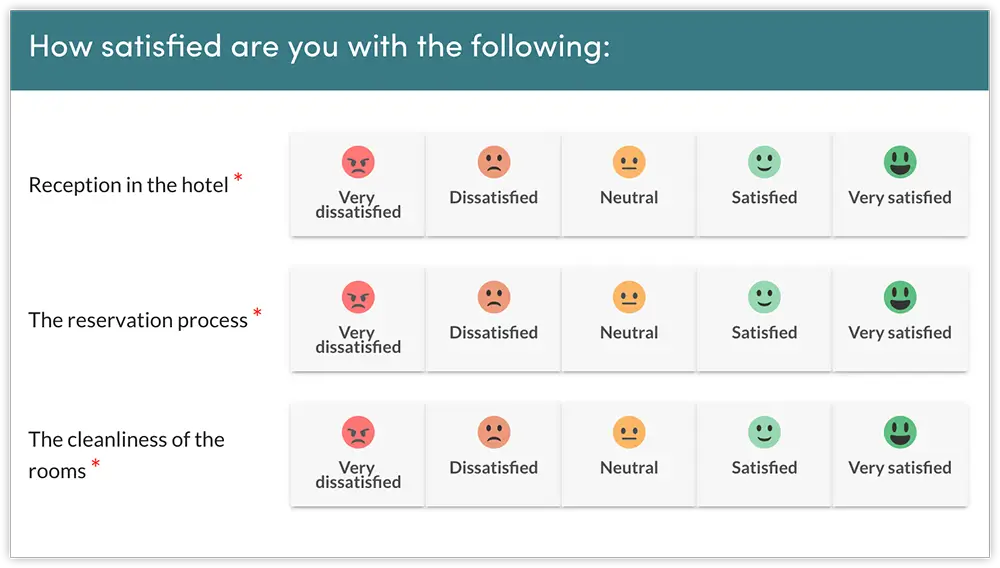
3. Send your hotel survey questions automatically using InputKit
Once you have composed your questions based on our sample hotel questionnaire, it is now time to think about the optimal sending method. With the InputKit customer experience solution, send the right questionnaire, to the right customer, at the right time. Following a stay with you, a few hours after departure, it is recommended to send an automated satisfaction questionnaire to your customers to evaluate their stay.
The InputKit solution allows you to create personalized questionnaires and program them to be sent via SMS and emails . Thus, you do not have to manually write or call each of your customers to assess the quality of the experience. In addition, thanks to our solution, you can automatically send your satisfied customers an online review proposal on your review platforms, such as Google My Business, Expedia, Trip Advisor, Yelp, Booking.com, and more! So, by having more positive reviews on your online review platforms, you are sure to increase the likelihood that a potential customer will view you positively. Growth in positive reviews will have a positive impact on your revenue. Optimizing your online reviews is a key marketing strategy for your hotel!
With the InputKit customer experience solution, you can also rate your employees based on feedback from your customers. Thus, you will be able to motivate your employees by sharing positive feedback. In addition, you will have an average score per employee, based on feedback from your customers, which will allow you to assess the quality of service offered within your establishment. To optimize your processes, you must first and foremost have better visibility on what is happening within your establishment! This is a key takeaway from this article on hotel survey questions.
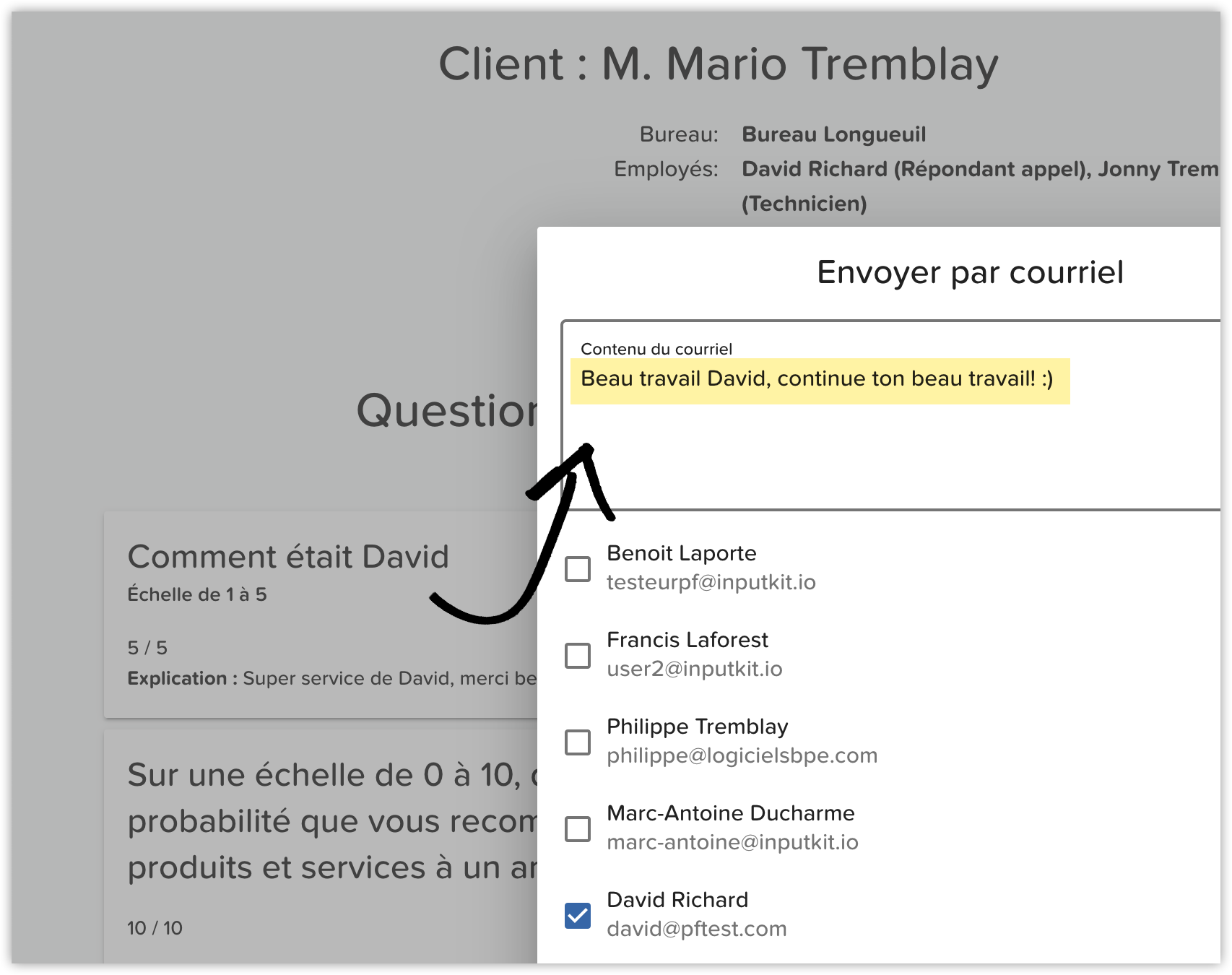
4. Measure the results of your satisfaction surveys
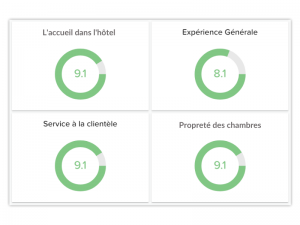
5. Make sure you optimize practices within your hotel
Do not see more negative feedback as an end in itself, but rather as an opportunity for improvement. Be sure to keep an eye on your customer reviews to spot any big trends. For example, if the results of your questions related to the decor of your hotel, be sure to put in place elements to improve your establishment and bring it up to date. If the score related to the frequency of cleaning of the rooms seems regularly negative, make sure to increase the frequency and the quality of the cleaning carried out. Your key metrics are numbers that speak for themselves and should inspire you to implement changes that will make a big difference. This is how you will be able to improve your hotel customer experience!

6. Make sure to create a committee in charge of customer experience
To ensure that you frequently optimize your customer experience , why not set up a dedicated committee within your establishment? This committee will thus be able to meet, at least once a month, to discuss the priorities to be put in place to optimize the stay of your guests. In this committee, be sure to include people from several departments to ensure that you have a good representation of the various issues raised by your customers. In addition, assigning this load to multiple individuals will optimize processes and reduce perceived workload. Certainly, the establishment of such a committee will be favorable for your hotel!
Finally, we hope that this example of hotel survey questions will be relevant for your establishment in the field of tourism. Be sure to first determine the customer satisfaction factors you want to assess and then formulate the related questions. Thereafter, program the sending of questionnaires via an automated solution like InputKit and keep an eye on your key metrics via an optimized dashboard . Once you’re able to see your key metrics, optimize your practices based on recurring feedback. Do not hesitate to contact a member of our team of experts to implement an effective solution for optimizing customer satisfaction within your hotel!
FREE FRENCH EBOOK Why and How to Monitor the NPS? Everything to know about the Net Promoter Score!

Related articles

June 14, 2022
10 Types of Customer Satisfaction Survey Answers
May 5, 2022
11 Examples of Bad Customer Experiences

January 24, 2022
How to Improve Employee Job Satisfaction : 9 Tips

Receive our best articles and tips by email
Be the first to know about our new articles.
Don’t forget to share this article!
- (855) 776-7763
All Products
BIGContacts CRM
Survey Maker
ProProfs.com
- Get Started Free
Want insights that improve experience & conversions?
Capture customer feedback to improve customer experience & grow conversions.
100+ Market Research Questions to Ask Your Customers

Babu Jayaram
Head of Customer Success - ProProfs
Review Board Member
Babu Jayaram brings over 20 years of experience in sales and customer service to his role on the Qualaroo Advisory Board. With a profound understanding of sales and conversion strategies, ... Read more
Babu Jayaram brings over 20 years of experience in sales and customer service to his role on the Qualaroo Advisory Board. With a profound understanding of sales and conversion strategies, Babu is committed to delivering exceptional results and fostering robust customer relationships. His expertise extends beyond mere management, including adept handling of support tickets, overseeing internal and customer-facing knowledge bases, and training support teams across diverse industries to ensure exceptional service delivery. Read less
UX & User Research Expert
Dwayne Charrington is a UX design and user research expert who explores a wide range of topics, including lead generation, feedback management, A/B testing, survey accessibility, and emerging technologies like AI and VR.

Asking the right market research questions can help you understand your target customers and map their behavior and preferences.
But what does it actually mean?
Let’s look at a sample from a market research survey report for mapping brand awareness:

From this simple Q&A report, you can:
- Visualize the proportions of demographic segments among your audience.
- Measure how your brand is performing in comparison to others.
- Pick the top preferred brand among the customers, explore what makes it stand out, and apply the same techniques to your brand.
- See how your target market perceives brand advertisements and promotional efforts.
Now imagine if this type of data set is available for different aspects of your business – product development, marketing campaigns, optimization plans, and more.
That’s what market research does for you.
With the evolution of customer interaction points and constantly changing market trends, more and more businesses are fueling efforts to do in-depth market research, as evidenced by the steady increase in the revenue of the market research industry worldwide.

Market research can help you develop essential business strategies and maintain a competitive advantage over other brands to increase conversions and customer base.
And it all starts with asking the right questions to the right audience.
That’s why we have created this collection of 100+ market research questions to ask your target market. Each question aims to uncover a specific attribute about your customers. You can use a combination of these customer research survey questions, interviews, and othe marketing questionnaires for customers.
We have also added key tips to help you write your own effective market analysis questions if the needed.
100+ Great Market Research Questions to Ask Your Customers
The main challenge while designing and conducting research is – “What questions should I ask in my customer research survey?
That’s why we have a carefully curated list of market research questions to help you get started.
To Explore New Product Opportunities

- What was your first reaction to the product?
- Would you purchase this product if it were available today?
- What feature would you like to see on the website/product?
- Which feature do you think will help improve the product experience for you?
- Of these four options, what’s the next thing you think we should build?
- What’s the one feature we can add that would make our product indispensable for you?
- Would implementing [this feature] increase the usability of the [product name]?
- Please let us know how we can further improve this feature.
- What problem would you like to solve with our product?
To Collect Feedback on Existing Products
- Have you heard of [product name or category] before?
- How would you feel if [product name] was no longer available?
- How disappointed would you be if you could no longer use [Product/feature name?]
- How often do you use [product name]?
- How long have you been using [product name] for?
- When was the last time you used [product name]?
- Please rate the following product features according to their importance to you.
- According to you, In which area is this product/service lacking the most? Specify below.
- How does the product run after the update?
- Rate our product based on the following aspects:
- Have you faced any problems with the product? Specify below.
- What feature did you expect but not find?
- How are you planning to use [product or service]?
- How satisfied are you with the product?
To Segment the Target Market

Please specify your age.
- Please specify your gender.
- Select your highest level of education.
- What is your current occupation?
- What is your monthly household income?
- What is your current marital status?

- What is the name of your company?
- Where is your company’s headquarters located?
- Please specify the number of employees that work in your company.
- What is your job title?
- In which location do you work?
- Which activity do you prefer in your free time?
- Which other physical activities do you take part in?
- Where is your dream holiday destination?
- Please rate the following as per their priority in your life – Family, work, and social life?
- Are you happy with your current work-life balance?
- Do you describe yourself as an optimist or a pessimist?
- How often do you give to charity?
- How do you travel to work?
- How do you do your Holiday shopping?
To Conduct a Competition Analysis

- Which product/service would you consider as an alternative to ours?
- Rate our competitor based on the following:
- Have you seen any website/product/app with a similar feature?
- How would you compare our products to our competitors?
- Why did you choose to use our [product] over other options?
- Compared to our competitors, is our product quality better, worse, or about the same?
- Which other options did you consider before choosing [product name]?
- Please list the top three things that persuaded you to use us rather than a competitor.
- According to you, which brand best fits each of the following traits.
To Gauge Brand Awareness
- [Your brand name] Have you heard of the brand before?
- How do you feel about this brand?
- How did you hear about us?
- Describe [brand name] in one sentence.
- If yes, please tell us what you like the most about [your brand name]?
- If no, please specify the reason.
- How likely are you to purchase a product from this company again?
- If yes, where have you seen or heard about our brand recently? (Select all that apply)
- Do you currently use the product of this brand?
- Have you purchased from this brand before?
- Of all the brands offering similar products, which do you feel is the best brand?
- Please specify what makes it the best brand for you in the category.
- Which of the following products have you tried? (Select all that apply)
- On a scale of 1 to 10, how likely would you recommend this brand to a friend or colleague?
To Map Customers’ Preferences
- Have you ever boycotted a brand? If so, which brand and why?
- What influences your purchase decision more – price or quality of the item?
- How many hours do you spend on social media like Facebook, Instagram, etc.?
- How do you do your monthly grocery shopping – online or through outlets?
- How do you search for the products you want to buy?
- Rate the factors that affect your buying decision for [product].
- What persuaded you to purchase from us?
- How likely are you to purchase a product from us again?
- Please rate the following aspects of our product based on their importance to you.
- What is the most important value our product offers to you?
- Which of the following features do you use least?
- How well does the product meet your needs?
To Map Customers’ Reservations
- Is there anything preventing you from purchasing at this point?
- What’s preventing you from starting a trial?
- Do you have any questions before you complete your purchase?
- What is the main reason you’re canceling your account?
- What are your main reasons for leaving?
- What was your biggest fear or concern about purchasing from us?
- What is the problem that the product/service helped to solve for you?
- What problems did you encounter while using our [product]?
- How easy did we make it to solve your problem?
- What is your greatest concern about [product]?
- Have you started using other similar products? If yes, what made you choose that product?
To Perform Pricing Analysis
- Would you purchase the product at [price]
- According to you, what should be the ideal price of the [product name]?
- Is our product pricing clear?
- According to you, what is the ideal price range for the product?
To Collect Feedback on Website Copy
- Please rate the website based on the following aspects:
- How well does the website meet your needs?
- Was the information easy to find?
- Was the information clearly presented?
- What other information should we provide on our website?
- How can we make the site easier to use?
- What could we do to make this site more useful?
- Is there anything on this site that doesn’t work the way you expected it to?
- How easy was it to find the information you were looking for?
- Have feedback or an idea? Leave it here!
- Help us make the product better. Please leave your feedback.
To Assess Website/Product Usability
- Are you satisfied with the website layout?
- What features do you think are missing on our website?
- What features do you not like on our website?
- Was our website navigation simple and user-friendly?
- How much time did it take to find what you were looking for on our website?
- Was it easy to find the products you are looking for?
- Was the payment process convenient?
To Uncover Market Trends and Industry Insights
- Did you purchase our product out of peer influence or individual preference?
- How do you form your opinion about our product?
- Do you follow trends of the product, or do you prefer to go with what you know?
- Do discounts or incentives impact your decision-making process?
Market Research Survey Templates
One of the easiest ways to conduct market research is to use survey templates. They can help you save time and effort in creating your own market research surveys.
There are many types of market research survey templates available, depending on your objectives and target audience. Some of the most popular ones are:
- Demographic Templates: These templates help you segment your customers based on their location. It can help you tailor your marketing strategies and offers to different customer groups.

- Consumer Behavior Templates: These templates help you keep your pulse on your target market.
Industry Insights Templates: These templates help you get detailed information about your target industry and business.

Breakdown of Different Market Research Questions
The answer choices in a market research survey question can significantly impact the quality and reliability of the response data you collect from the audience.
Some answer types help categorize the audience, while others measure their satisfaction or agreement.
So, before listing the customer research survey questions to ask your target audience, let’s understand their types:
Multiple Choice
A multiple-choice question type lets users select more than one answer from the given options. These questions are great for collecting multiple data sets using the same question and gauging people’s preferences, opinions, and suggestions .

Single Choice
In a single-choice question, the respondent can select only one answer from the given options. This question type is great for:
- Segregating the users.
- Prioritizing product updates based on user consensus.
- Disqualifying irrelevant respondents by placing the question at the start of your customer research survey.

Matrix Match
A matrix matching grid can combine multiple market research questions into one to make the survey shorter . There is only one condition – the individual questions should have the same response anchors as shown in the image below:

The questions are arranged in rows while the answer options occupy the grid columns.
Ranking Question
A ranking question can help map customers’ preferences and set priorities for product development . This question type asks the respondent to arrange the given options in their decreasing/increasing preference.

Dichotomous
A dichotomous question poses a simple yes or no scenario to the respondent. These question types can help disqualify irrelevant people from the survey and categorize the users into two groups .

Likert Scale
Likert scale market research questions can help you measure the extent of respondents’ agreement/disagreement with the given statement . The answer options are arranged from positive to negative sentiments or vice-versa, with the neutral option in the middle.

There are two types of Likert scales: 5-point and 7-point .
Open-ended market questions let you explore the respondents’ minds without adding any restrictions to the answer . This question type is followed by a blank space for the respondent to add a free-text response.

You can add an open-ended question as a follow-up after the first question to explore the reasons for the customer’s previous answer. It also lets you collect more in-depth information about their issues, pain points, and delights.
Tools like Qualaroo offer tons of different question types for your surveys. Just pick the question and match its answer option type from the drop-down. To make it more effective, you can add branching to the survey.
How to Write Your Marketing Research Questions
It’s imperative to have a dedicated repository of market research questions for your surveys. But nothing’s better than crafting your questions.
For this, you need to sit with your team and discuss what information you require from the customers. It lets you analyze and document how much data you already have in your system, which can help set the market research scope.
We have listed some questions you need to ask yourself before asking market research questions to your potential customers or target market:
Audience Segmentation Questions
Audience segmentation questions help to size up your target market and provide a granular view of the audience . Not all customers are equal, and audience segmentation makes it possible to focus on each group individually to address their issues, fears, and expectations.
Here’s what you need to know before you start writing customer research survey questions to understand your audience:
- Do we understand the demographics of the new market we are trying to target? (Age, location, ethnicity, education, company, annual income, etc.)
- What are the locations that drive the most customers to our business? How are these locations different from others?
- What are the interests, preferences, and fears of people from our new target market? Have we addressed these situations for our current customer base?
- What are the psychographics attributes of the current customers and potential market? Are we targeting these in our campaigns?
- What are the most popular engagement channels for our customers? Which channels drive the most traffic to our website?
- Do we have enough data to perform value segmentation to separate high-value customers from low-value customers?
- How often do these high-value customers make a purchase?
Product-Based Market Research Questions
Product-based market research questions can produce precious insights to channel into your product development and optimization strategies . You can see how changing technology affects customers’ behavior, what new features they want to see in your product, and how they perceive your products and services over the competition.

Start by gathering information about the following:
- How does our product compare to the competition based on the features?
- What products do our competitors offer?
- What new features do customers want to see in our products? Do we have a product roadmap to deliver these updates?
- What unique solutions do our products offer? What is the value proposition that reflects this offering?
- Does our product incorporate the latest technological advancements?
- What channels do we use to collect product feedback from our users?
- What are customers’ preferences while choosing our products over competitors?
Pricing Market Research Questions
Pricing analysis can help you make your product more affordable to different customer segments while maintaining the desired gross margin. It also lets you restructure the pricing tiers to provide features depending on the customers’ requirements and company size .
Watch: (1/5) Supercharge Your Revenue With Data-Driven Pricing
Your sales and marketing team can help you hone in on the market research questions to ask your customers for running pricing analysis:
- Do the customers ever complain about the difficulty in finding the pricing information?
- What is the pricing structure of our competitors for the same products? What features do they include for a specific price?
- How do customers find our pricing when compared to the competitors?
- Do our products provide value for money to the customers? Does the sales pitch reflect this point?
- Can we restructure the pricing, and how will it affect the revenue?
- Are there any customer segments that have high-value potential but find the current pricing unaffordable? What are the plans for such customers?
- Are we in a situation to offer a basic free plan to encourage customers to try our product before upgrading?
- What promotions can we run to attract more customers?
- Should we target customers based on income, company size, or type of solution to set our product prices?
Brand Reputation Market Research Questions
A brand reputation questionnaire for marketing research gives you information on how well your target market knows about your brand. You can uncover previously unidentified channels to increase brand awareness and find potential customers to promote your brand .
Start by gauging what customers are saying about your brand:
- Which channels receive mentions of our brand? Are these posts positive or negative?
- Do we have a system in place to analyze and monitor these reviews and posts?
- What are the reviews of our brand on different sites? What is the overall impression of our brand in the market?
- How are we currently addressing the negative reviews and complaints? What do our customers think about the handling process?
- What is the impression of our brand in our target market?
- What brand awareness campaigns are our competitors running?
- Is our brand among the top choices of our target customers?
Advertisement & Campaign-Based Questions
These customer research survey questions let you assess the effectiveness of your current value propositions and campaigns . You can channel the customer insights into your advertising strategies to design targeted campaigns for different customer segments to reduce the overall acquisition cost and increase conversions.
Ask the following questions to collect information about the different marketing campaigns that are performing:
- What are the best modes to run the advertisement campaigns to reach our target audience?
- What is the estimated lifetime value of customers acquired from current campaigns? Is it higher or lower than the acquisition costs?
- Which campaigns bring the most ROI and why?
- How well do our advertisements present our value proposition to the customers? Do they address customers’ fears and expectations to attract them?
- Are we running A/B tests to improve our online campaigns? How are we gathering data to build the A/B test hypotheses – surveys, heatmaps, eye tracking, etc.?
- What advertisement campaigns do our competitors run?
7 Question Types to Use in Market Research Surveys
We mentioned earlier that market research questions provide important data for different operations like product development, marketing campaigns, sales pipeline and more.
But to what extent?
Let’s break it down to individual processes and understand how insights from customer research surveys can impact them:
To Know Your Target Market
Understanding your target audience is the fundamental aspect of market research, be it a new target market or existing customers. If you know what marketing research survey questions to ask your target market, you can identify different customer types’ unique traits and preferences.
The data can help you segment the users based on demographic, psychographic, geographic, and other attributes. These include their behavior, purchase preferences, age, location, habits, delights, frustrations, and more.
You can then create various customer personas and fuel your sales strategies to maximize ROI.
Case study – How Avis increased its revenue per customer
Avis, a leading car rental company, was looking to enhance customer experience by offering useful car add-ons like navigation systems, child seats, insurance, etc., to customers with their booking. So, it reached out to AWA Digital to find a way to promote these products and increase their sales.
AWA digital implemented customer research campaigns using targeted surveys to determine which add-ons were popular among the customers and why.
Using these insights, the team added an interstitial pop-up just before the booking page to show relevant add-ons to the customers.
This simple update dramatically increased the sales of add-on items and helped Avis generate more revenue per customer.
Read the entire case study here .
To Plan the Product Roadmap
A product roadmap is a visual representation of the current status of your product and planned updates over time. It shows a high-level summary of planned activities and priorities for different teams to take the product to the next level.
Steve Jobs famously said – “You’ve got to start with the customer experience and work backward to the technology. You can’t start with the technology then try to figure out where to sell it.”
And market research helps to align your product strategies with the customer demand. Using targeted marketing survey questions, you can gauge what new features or functionality customers want to see in your products.
It helps to plan product development strategies based on customers’ consensus to prioritize the ideas that can have the most impact on customers and replace intuition-based approaches with data-backed decisions.

Customers’ demands change with market trends and technological advancements. That’s why your product map also needs to evolve constantly with time to reflect these changes in your product development cycle.
By designing targeted market research questions to ask the customers, you can uncover their expectations to deliver optimal product solutions.
That’s what our next case study demonstrates.
Case study – How customer research drives Twilio’s operations
Twilio, a cloud communications platform places customer discovery and research at the core of their product development strategies. It helps its teams to anticipate customer needs in a constantly changing market.
Lack of time and budget are the two biggest challenges that the company faces in its product development cycle. So, the team uses targeted market research questionnaires for a product to understand the challenges the customers face today and the ones they will face tomorrow.
With an abundance of ideas and no time to test them all, the feedback data from surveys is used to prioritize the hypotheses to run the tests. It makes the process more efficient and effective in producing positive results.
This data-backed approach is used across 18 different teams at Twilio to release new functionality every week and deliver optimal solutions to the clients.
Read the complete case study here .
To Reduce Acquisition Costs
Your customer base consists of multiple customer segments with different preferences and purchase potential. That’s why you cannot sell to everyone and need to find the right audience for your products.
If an acquired customer doesn’t bring in more revenue than it costs to acquire them, it will increase your acquisition costs over time.
We don’t want that, do we?
For example, let’s say you are targeting the entire market population using the same campaign. If your acquisition cost per customer is $300 and you acquire 20 customers from one campaign, you need to make more than $6000 to register profits.
The difficulty is you don’t know about these customers’ purchase behavior and capacity, so you cannot be sure if you will reach your goals. It adds unnecessary risks to your marketing ventures.
But, if you were targeting a specific segment with high income, regular shopping habits, or proven history of brand loyalty, You can obtain better results.
Now, the question is –
How will you separate these potential long-term customers from one-time buyers and high-value targets from other segments?
One way to do this is by building customer personas using the data from the market research survey questions. A buyer persona defines different attributes of a particular customer segment so you can hone in on the right audience to funnel your marketing efforts.
Here’s what a typical persona includes:
- Target regions
- Target demographic (age, marital status, gender)
- Ideal psychographics (hobbies, social channels, activities they indulge in, goals)
- Preferred interaction channels
- Favorite brands and products
- Total revenue till date
- Estimated lifetime value
Once you have a clearer picture of different customers, you can find high-value prospects with the potential to be long-term customers looking for product solutions that your business offers.
You can then design the correct pitch using the market research data to bring in these customers and control the overall acquisition costs.
For example:
- Plugin the demographic and psychographic data into CRM software like BIGContacts or Salesforce to convert high-value targets.
- Use your CRM to create segmented lists of prospects based on estimated value, location, current status, and more. Then target these groups individually with personalized value propositions to increase conversion rates.
- Identify their preferred mode of communication and technographic inclinations to find the right opportunities to pitch your product offering at the precise moment.
Even if acquiring and retaining such customers costs more, their overall revenue can balance the acquisition costs to deliver higher profits.
To Design Targeted Marketing Campaigns
By knowing how your target audience behaves and interacts with your business, you can find the exact opportunities to target them with personalized campaigns.
- You can use mail campaigns to target website users with app-exclusive offers to encourage them to download your app and improve app adoption.
- Add in-app broadcast messages about upcoming offers, exclusive membership benefits, and other incentives for new users to push them towards the end of the funnel.
- Create multiple landing pages to target different customer types.
- Design location-based ad campaigns with personalized value propositions based on audience preferences and problems at each location.
Case Study – How Canon’s campaigns generated 700% ROI
AWA digital was tasked by Canon, one of the biggest electronics companies worldwide, to assess and increase the demand for their products in different geographies. So, the AWA team conducted customer research using target market survey questions and discovered the following attributes about customers’ purchase behavior and reservations:
- In some regions, people were reluctant to spend money on a Canon camera as they weren’t sure if Canon was an authoritative brand.
- In other regions, authority was not as important to the users.
Using these insights, AWA optimized the ads campaigns’ messaging for different locations to include what consumers deemed important purchase factors.
The results?
With in-depth customer feedback, Canon generated an overall ROI of 700% in all regions using personalized campaigns to target the audience.
To Improve Brand Awareness
Whether you are into soft drinks or not, You probably would have heard of Coca-Cola’s 2011 Share-A-Coke ad. This single campaign put the Coke brand back on the map and reversed the 10-year steady decline in sales in the US.
Coke understood what motivates their customers and delivered a product offering that appealed to the masses to increase its brand equity- the excitement to get a Coca-Cola bottle with their name on it.
How did they do it?
In 2011, Coca-Cola rolled out its share-a-coke campaign in Australia. The company debranded the traditional Coke logo from the bottle and replaced it with the phrase “Share a Coke with” followed by a name.
The campaign used the list of the country’s most popular names (nicknames). The purpose was to make people go out and find the Coke bottle with their name on it and share it with their friends. The campaign was subsequently rolled out in 80 countries.
How did it impact Coca-Cola as a brand:
- In Australia, it’s estimated that the campaign increased Coke’s share by 4% and increased consumption among young adults by 7%.
- #ShareACoke became the top trending hashtag on Twitter globally and received over 1 billion impressions.
- In the USA, the campaign increased Coke’s market share by over 2% and brought 11% more sales compared to the previous year.
It’s not limited to big brands only.
Understanding the customers and placing your product’s value offering along with their habits, lifestyle, and behavior can help you extend your brand’s reach.
Today, there are multiple touchpoints to connect with your customers and map their journey to uncover their issues, motivations, and fears to address in your campaigns.
- Monitor brand mentions on social media and engage with the users to cultivate an online community and promote your brand.
- Reach out to satisfied customers and turn them into your brand ambassadors.
- Use targeted ad campaigns that connect people’s emotions and general behavior to imprint your brand’s image in their minds.
Quick Tips for Writing Awesome Market Research Survey Questions
With the inter-team research complete, you are ready to write your own market research questions to ask your target audience. Keep these general dos and don’ts in mind to ensure that the market survey fulfills the purpose without affecting the data quality or response rate.
Use Mutually Exclusive Response Options
If you are using response anchors with specific ranges like age group or income, check that the options do not overlap . Otherwise, it will produce an irregular data set.
Please specify your age:
In the above example, the respondent lying on either extremity of the given age ranges may get confused on which option to choose. For example, a 28-year-old respondent can choose from both second or third options.
Plus, two different respondents of the same age may select different options, which will skew your demographic data.
You can avoid this confusion by creating mutually exclusive groups as shown below:
Always Add A “Not Applicable” Or “Rather Not Say” Option
Since market research questions extract personal information, some respondents may not want to share such details with you. These include questions about age, income, gender, hobbies, social activities, and more.
Forcing such questions on the customers without allowing them to skip can irate them and lead to survey abandonment .
That’s why you can also use Qualaroo’s skip and branching logic to create smart surveys that only ask relevant questions to your respondents based on their previous answers.
Calculate the Required Sample Size
Sample size plays a vital role in your market research questions to determine the reliability of your response data.
If the response volume is low, the results may not be conclusive to point towards customers’ consensus. On the other hand, a larger sample size than required means a waste of the company’s valuable resources and time.
That’s why it’s important to calculate the required sample size to estimate the number of responses you need for your market research survey questions.
You can use any survey sample size calculator available online to get started. Just fill in the required details to get the required sample size.

For example, to reach a statistical significance of 99%, you need at least 3145 responses to your market research questionnaire.
Consider Adding Incentives
Studies show that incentivized customer research surveys or questionnaires fetch higher response rates than general surveys.
The incentives encourage customers to invest their time in a survey and get something in return.
It means creating a gated questionnaire for market research can help you reach the required sample size quickly . The incentive can be a simple discount code, free shipping coupon, free ebook, or other freebies.
However, there is a possibility that irrelevant respondents may fill out the survey randomly just to get to the offer, which may skew the results. You can use screening questions to filter out unsuitable respondents.
Avoid Double-Barreled Market Research Questions
A double-barreled question poses two questions into one. The problem with such questions is that the respondent may have opposing views about the two statements in the questions. It makes it harder for them to choose one answer from the options .
“Please rate the [product name] on a scale of 1-10 based on overall quality and price?”
Here, the respondent may find the product quality appreciable while thinking it to be overpriced at the same time. In such a case, they may skip the question or select any option randomly.
You can easily sidestep this hurdle by breaking your double-barreled market research question into two to make it less confusing for the respondents.
Importance of Market Research
We mentioned earlier that market research questions provide important data for different operations like product development, marketing campaigns, sales pipeline, and more.
Understanding your target audience is the fundamental aspect of market research, be it a new target market or existing customers. If you know what customer research survey questions to ask your target market, you can identify different customer types’ unique traits and preferences.
AWA Digital implemented research campaigns using targeted customer research surveys to determine which add-ons were popular among the customers and why.
Steve Jobs famously said – “You’ve got to start with the customer experience and work backward to the technology. You can’t start with the technology and then try to figure out where to sell it.”
And market research helps to align your product strategies with the customer demand. Using targeted customer research survey questions, you can gauge what new features or functionality customers want to see in your products.
Image Source: Slide Team
By designing targeted market research questions to ask the customers, you can uncover their expectations to deliver optimal product solutions.
Case study – How customer research drives Twilio’s operations
Twilio, a cloud communications platform, places customer discovery and research at the core of its product development strategies. It helps its teams to anticipate customer needs in a constantly changing market.
Lack of time and budget are the two biggest challenges that the company faces in its product development cycle. So, the team uses targeted market research questionnaires for a product to understand the challenges the customers face today and the ones they will face tomorrow.
With an abundance of ideas and no time to test them all, the feedback data from customer research surveys is used to prioritize the hypotheses to run the tests. It makes the process more efficient and effective in producing positive results.
Your customer base comprises multiple customer segments with different preferences and purchase potential. That’s why you cannot sell to everyone and need to find the right audience for your products.
For example, let’s say you target the entire market using the same campaign. If your acquisition cost per customer is $300 and you acquire 20 customers from one campaign, you must make over $6000 to register profits.
But, if you were targeting a specific segment with high income, regular shopping habits, or a proven history of brand loyalty, you could obtain better results.
Now, the question is –
Image Source: brightspark
- Plug the demographic and psychographic data into CRM software like BIGContacts or Salesforce to convert high-value targets.
- Use your CRM to create segmented lists of prospects based on estimated value, location, current status, and more. Then, target these groups individually with personalized value propositions to increase conversion rates.
- Add in-app broadcast messages about upcoming offers, exclusive membership benefits, and other incentives for new users to push them toward the end of the funnel.
AWA Digital was tasked by Canon, one of the biggest electronics companies worldwide, to assess and increase the demand for their products in different geographies. So, the AWA team conducted a customer research survey using target market questions and discovered the following attributes about customers’ purchase behavior and reservations:
- In other regions, authority was not so important to the users.
Whether you are into soft drinks or not, you probably would have heard of Coca-Cola’s 2011 Share-A-Coke ad. This single campaign put the Coke brand back on the map and reversed the 10-year steady decline in sales in the US.
Coke understood what motivates its customers and delivered a product offering that appealed to the masses to increase its brand equity- the excitement to get a Coca-Cola bottle with its name on it.
- In Australia, it’s estimated that the campaign increased Coke’s share by 4% and consumption among young adults by 7%.
It’s not limited to big brands only.
Market Research: A Key to Your Business’ Success
Market research is a vital process for any business wanting to understand its customers and market better. By asking the right questions and using the right tools like Qualaroo, you can gain valuable insights that can help you improve your products or services, enhance your customer experiences, and grow your business.
In this blog, we have shared some of the best market research questions to ask your customers, as well as some of the best customer research survey templates to find market trends and industry insights. We hope that this blog has helped you learn more about market research and how to conduct it effectively.
About the author
Dwayne charrington.
Dwayne Charrington is an expert in UX design and user research, showing a strong grasp of how to improve user interfaces and interactions. He explores a wide range of topics, including lead generation, feedback management, the importance of survey accessibility, and how new technologies like AI and VR are changing how users interact with products. He shares insights on creating clear navigation, using A/B testing to make smarter design choices, and the power of storytelling in UX. Dwayne also focuses on optimizing mobile experiences and champions privacy-by-design, ensuring users feel satisfied, secure, and valued.
Hotel Guest Satisfaction Survey: 50 Helpful Questions (+ Survey Template)
A hotel depends on its guests to stay in business. Nothing complicated about that. But it’s not just about how many guests you can attract – but how many satisfied guests leave your hotel. For hotels in North America, things aren’t looking good.
According to a review of 6 million user-generated reviews and 20 million online comments , guests are more dissatisfied with hotel stays compared to before the pandemic. The biggest decline in guest satisfaction was seen in North America, with a Global Review Index of 83.3 percent, a drop of 3.5 points from 2019.
If you want to know just how satisfied your clients are, you should prepare a hotel guest satisfaction survey.
Table of Contents
What is a Guest Satisfaction Survey?
A Hotel Guest Satisfaction Survey is a tool used by hotels to gather feedback from their guests about their experiences during their stay. These surveys typically cover various aspects of the guest experience, including the quality of accommodations, cleanliness, amenities, customer service, and overall satisfaction.
These surveys collect valuable insights from guests to understand what they enjoyed about their stay and areas where improvements may be needed. By analyzing the feedback from these surveys, hotels can identify trends, address issues, and enhance the overall guest experience.
How Can a Guest Satisfaction Survey Help You?
A guest satisfaction survey can be a valuable tool for businesses in various industries, especially those in the hospitality sector, such as hotels, restaurants, and resorts. Here’s how it can help:
- Understanding Customer Experience: Guest satisfaction surveys provide insights into the customer experience. They help businesses understand what guests like and dislike about their products or services from when they arrive until they leave. This understanding is crucial for improving and refining the overall customer experience.
- Identifying Areas for Improvement: Businesses can pinpoint specific areas that need improvement by collecting feedback directly from guests. Identifying these areas allows businesses to prioritize and address issues effectively, whether it’s cleanliness, staff friendliness, amenities, or other factors.
- Measuring Performance: Guest satisfaction surveys allow businesses to track their performance over time. By comparing results from different periods, businesses can see if changes or improvements have had the desired impact on guest satisfaction levels.
- Building Customer Loyalty: Showing guests that their opinions matter by actively seeking their feedback can help build loyalty. When guests see that a business is responsive to their feedback and actively works to improve their experience, they are more likely to return in the future and recommend the business to others.
- Benchmarking Against Competitors: Guest satisfaction surveys can also provide insights into how a business stacks up against its competitors. Benchmarking against industry standards or competitors’ performance can help identify areas where the business excels and areas where it falls short, allowing for strategic adjustments to stay competitive.
Why Should You Use a Guest Satisfaction Survey?
A hotel guest satisfaction survey can be incredibly beneficial for various reasons:
- Benchmarking Performance: Hoteliers can use satisfaction survey data to compare their performance against industry benchmarks or competitors. This benchmarking process provides valuable insights into how the hotel fares compared to others in the market and helps identify areas where they may need to catch up or differentiate themselves.
- Improving Reputation and Brand Image: Positive feedback gathered from guest satisfaction surveys can be used to highlight the hotel’s strengths and showcase positive guest experiences. This can lead to improved reputation and brand image, attracting more guests and fostering loyalty among existing ones.
- Reducing Negative Reviews and Complaints: Proactively addressing issues raised in guest satisfaction surveys can help prevent negative reviews and complaints. By resolving issues promptly and effectively, hotels can mitigate potential damage to their reputation and maintain positive relationships with guests.
50 Helpful Survey Questions (+Survey Template)
To make things easier for you, we’ve created a template you can copy and use for your hotel. If you want, you can also edit the survey to your wishes, meaning you can add or subtract questions. You can find the survey by clicking this link here .
But if you want to look at each individual question and why you should ask your guests something like that – we’ve got you covered. Below, you can find 50 hotel guest satisfaction questions for your survey.
1. How would you rate the ease of the check-in process?
This question evaluates the efficiency and user-friendliness of the check-in experience at the hotel. It aims to identify any hurdles or delays guests might encounter upon arrival, ensuring a smooth start to their stay.
2. Were you satisfied with the cleanliness of your room upon arrival?
This question assesses guests’ initial impressions of their rooms, focusing on cleanliness and readiness. A clean room is fundamental to guest satisfaction and sets the tone for their entire stay.
3. Did the room amenities meet your expectations?
This inquiry gauges whether the provided room amenities, such as toiletries, linens, and technology, align with guest expectations. It helps the hotel understand if the amenities offered are sufficient and satisfactory.
4. How comfortable was your bed?
Comfortable bedding is crucial for a restful stay, so this question seeks feedback on the bed’s comfort level. It helps ensure that guests can enjoy a good night’s sleep, which is a core aspect of their overall experience.
5. How would you rate the quality of the in-room dining service?
This question evaluates the in-room dining experience, covering aspects like menu variety, food quality, promptness of service, and presentation. It’s vital to understand the effectiveness of dining options in enhancing the guest experience.
6. Were the hotel staff friendly and helpful during your stay?
Friendly and helpful staff are key to a pleasant hotel experience. This question assesses how guests perceive the attentiveness, professionalism, and overall service quality of the hotel staff.
7. How effective was the room service in responding to your needs?
This seeks to understand the efficiency and reliability of room service in meeting guests’ requests, from extra pillows to food orders. It’s an important aspect of the hotel’s responsiveness and guest care.
8. Did the hotel’s facilities (e.g., pool, gym) enhance your stay?
This question inquires about the contribution of additional hotel facilities, like the swimming pool or gym, to the overall guest experience. It assesses whether these amenities add value to the guests’ stay.
9. How would you rate the variety and quality of food at our restaurant(s)?
It evaluates the dining experiences outside of room service, focusing on the diversity and quality of food in the hotel’s on-site restaurants and bars. A great dining experience can significantly enhance a guest’s stay.
10. Were you satisfied with the level of noise control in and around your room?
This question addresses the hotel’s ability to maintain a quiet and peaceful environment, minimizing noise disturbances from both inside and outside the hotel. Peace and quiet are crucial for guest comfort and satisfaction.
11. How easy was it to connect and use the Wi-Fi service?
In today’s connected world, reliable Wi-Fi is a must-have for guests. This question assesses the ease of connecting to and the quality of the hotel’s Wi-Fi service, which is essential for both leisure and business travelers.
12. Was the temperature control in your room satisfactory?
This seeks feedback on the room’s climate control system, ensuring guests can easily adjust the temperature to their comfort level. Effective temperature control is vital for creating a comfortable room environment.
13. How would you describe your overall sleep quality during your stay?
Good sleep quality is a cornerstone of a positive hotel experience. This question aims to gather insights into how well the hotel facilitates restful sleep through comfortable beds, quiet rooms, and effective temperature control.
14. Did you utilize the concierge service and, if so, how would you rate it?
For guests who use the concierge service, this question evaluates the helpfulness, knowledge, and efficiency of the concierge in enhancing their stay, from making reservations to offering local recommendations.
15. Were the common areas (lobbies, hallways) well-maintained and clean?
This question assesses the cleanliness and upkeep of the hotel’s shared spaces, such as lobbies, hallways, and lounges. Well-maintained common areas contribute to a positive impression and guest comfort.
16. How satisfied were you with the check-out process?
The check-out process is the last impression a guest has of the hotel, making its efficiency and smoothness crucial. This question evaluates how satisfied guests are with the ease and speed of the check-out experience.
17. Did you feel the overall ambiance of the hotel contributed to your experience?
This question probes into how the hotel’s overall atmosphere, including its design, decor, and ambiance, influences the guest experience. A pleasing ambiance can significantly enhance guest satisfaction and overall stay.
18. How likely are you to recommend our hotel to friends and family?
The likelihood of recommending the hotel is a strong indicator of overall satisfaction and a positive experience. This question helps gauge guest loyalty and the hotel’s success in meeting or exceeding expectations.
19. Was the hotel’s location convenient for your purposes?
Location is a key factor in choosing a hotel. This question seeks to understand whether the hotel’s location met the guests’ needs in terms of proximity to attractions, business centers, or transportation hubs.
20. Did you find our hotel to be a good value for the price?
This question evaluates guests’ perceptions of value for money, considering the cost of their stay relative to the quality of services, amenities, and overall experience provided by the hotel.
21. How responsive were hotel staff to any issues or requests you had?
Staff responsiveness to guest needs, questions, or issues is crucial for a satisfactory stay. This question assesses how effectively and promptly the hotel staff addressed guests’ concerns during their stay.
22. Were you informed about all the hotel services and amenities available to you?
This inquires whether guests were adequately informed about the hotel’s services and amenities, ensuring they could fully utilize and enjoy what the hotel has to offer.
23. How would you rate the safety and security measures of the hotel?
Safety and security are paramount for guests. This question seeks feedback on the hotel’s efforts to ensure guest safety through security measures, staff training, and emergency preparedness.
24. Did you use any special services (spa, business center), and how satisfied were you with them?
For guests who used additional services like the spa or business center, this question evaluates their satisfaction with these facilities, focusing on quality, convenience, and the overall enhancement of their stay.
25. How well did the hotel accommodate any special requests you had (e.g., dietary, accessibility)?
This question assesses the hotel’s flexibility and effectiveness in meeting special guest needs, such as dietary restrictions or accessibility requirements, which are essential for an inclusive and accommodating guest experience.
26. How satisfied were you with the parking facilities (if applicable)?
This question evaluates the convenience, security, and accessibility of the hotel’s parking facilities, which can significantly impact guests who arrive by car.
27. Was the interior design and decoration of the hotel to your liking?
It assesses guests’ appreciation for the aesthetic aspects of the hotel, including its style, art, and overall design, which contribute to the ambiance and experience.
28. How would you rate the environmental sustainability practices of the hotel?
This question gauges the guest’s perception of the hotel’s commitment to sustainability and eco-friendly practices, an increasingly important factor for many travelers.
29. Did you attend any events or use any meeting facilities at the hotel? How was your experience?
For guests who utilized event or meeting spaces, this question seeks feedback on the facilities’ quality, the service provided, and the overall satisfaction with the experience.
30. How satisfied were you with the laundry or dry cleaning services (if used)?
This inquires about the convenience, quality, and timeliness of the hotel’s laundry and dry cleaning services, which are important for guests needing garment care during their stay.
31. How did you find the overall cleanliness of the hotel outside of your room?
It assesses the guest’s perception of the hotel’s maintenance and cleanliness in areas beyond their personal room, reflecting the hotel’s overall hygiene standards.
32. Were there any hotel staff members who made your stay particularly memorable?
This question allows guests to acknowledge exceptional service from specific staff members, highlighting instances of outstanding hospitality and care.
33. How would you rate the quality of television, entertainment, and multimedia options in your room?
It evaluates the in-room entertainment options provided by the hotel, such as TV quality, channel selection, and other multimedia facilities, which enhance the guest’s in-room experience.
34. Did the hotel provide adequate information and guidance on local attractions and activities?
This question assesses the hotel’s role in enhancing the guest’s overall travel experience by providing valuable information about local sights, activities, and cultural events.
35. How would you rate your experience with the hotel’s booking process?
It inquires about the ease, clarity, and convenience of the booking process, from the hotel’s website to third-party platforms, impacting the initial impression of the hotel.
36. Did you experience any problems during your stay, and how well were they resolved?
This question seeks to identify any issues encountered during the stay and evaluates the hotel’s effectiveness in addressing and resolving these problems, crucial for guest satisfaction.
37. How satisfied were you with the variety and availability of in-room refreshments (mini-bar, tea/coffee)?
It gauges guest satisfaction with the selection and quality of in-room refreshments, which contribute to convenience and comfort during their stay.
38. How would you rate the acoustic insulation in your room (ability to block external sounds)?
This assesses the effectiveness of the room’s soundproofing in providing a quiet and disturbance-free environment, crucial for guest privacy and relaxation.
39. Did the hotel’s dining options cater well to your dietary requirements and preferences?
It evaluates the hotel’s ability to accommodate diverse dietary needs and preferences, reflecting the inclusivity and flexibility of its dining services.
40. How would you describe the responsiveness of the housekeeping staff?
This question seeks feedback on the efficiency, thoroughness, and discretion of the housekeeping service, which plays a significant role in maintaining room comfort and cleanliness.
41. Did the hotel offer any unique experiences or amenities that enhanced your stay?
It inquires about any distinctive features or services provided by the hotel that contributed positively to the guest’s experience, setting the hotel apart from others.
42. How would you rate the ease of navigating the hotel and its facilities?
This assesses how user-friendly the hotel layout is, including signage, accessibility, and the ease with which guests can find and utilize various facilities and services.
43. Were the bathroom facilities and amenities up to your standards?
It evaluates the cleanliness, functionality, and quality of bathroom amenities, an essential aspect of guest comfort and satisfaction.
44. How satisfied were you with the level of privacy offered in your room and throughout the hotel?
This question gauges the guest’s sense of privacy and seclusion within their room and the hotel, reflecting the hotel’s ability to provide a secure and private environment.
45. Did the hotel provide sufficient and convenient electrical outlets and charging stations in your room?
It assesses the availability and convenience of power sources within the room, crucial for charging devices and using electronic amenities.
46. How would you describe your experience with any transportation services offered by the hotel (shuttles, car hire)?
This inquires about the quality, convenience, and reliability of the hotel’s transportation services, which can significantly enhance the guest’s mobility and overall experience.
47. Was there anything about your room or the hotel that exceeded your expectations?
This question allows guests to highlight any aspects of their stay that were particularly impressive or surpassed what they anticipated, contributing to memorable experiences.
48. How likely are you to stay with us again in the future?
It gauges the guest’s overall satisfaction and loyalty by asking about their willingness to return, reflecting the hotel’s success in creating a positive and lasting impression.
49. Were there any areas or services you think the hotel could improve upon?
This open-ended question invites constructive feedback on any aspects of the hotel that could be enhanced, helping identify opportunities for improvement.
50. Can you please share any additional questions or suggestions you have?
This provides a space for guests to offer open-ended feedback or suggestions that may not have been covered by the specific questions, giving valuable insights into areas for enhancement.
Use HelloShift to Improve Guest Satisfaction
When hotels know what guests think; they can do things like make the check-in process faster, keep rooms cleaner, and even add more pancakes to the breakfast menu if that’s what guests love! It’s all about making sure that when guests leave, they’re already thinking about coming back. That’s what a hotel guest satisfaction survey can really help you with!
And when it comes to turning all those survey answers into real changes, HelloShift is like a superhero for hotels. It helps them understand all the feedback and determine the best ways to make guests happier. With HelloShift, hotels can ensure they’re doing everything they can to get big smiles from their guests every time.
Hotel guests receive automated, routine messages, consult hotel digital guidebook , and pre-checkin via their mobile device. Hotel teams use HelloShift to work together across buildings, floors, shifts, and departments with up-to-date visibility into room status via the Housekeeping app.
Go digital with Guest Messaging, Contactless Checkin, Website Chat, Staff Collaboration, Housekeeping Management and more.
HelloShift News
Let's get to know each other more
Hotel Scheduling Software 2024: Schedule Your Staff in 5 Steps
Master hotel staff scheduling in 5 easy steps with our comprehensive guide. Boost productivity and satisfaction in your hotel operations for 2024.
Guest Service in Hotel: Responsibilities, Duties, and Tips
Discover how to redefine guest service in hotels with our guide on responsibilities, duties, and tech tips to boost satisfaction and loyalty.
24 Hotel Housekeeping Tips for 2024
Discover the latest in hotel cleanliness with our 24 essential housekeeping tips for 2024. Elevate your hotel's appeal and guest satisfaction.
- Student Program
- Sign Up for Free

How to Create a Survey
30 insightful hotel survey questions
While the travel industry on the whole took a hit from the COVID-19 pandemic, forecasters are expecting international travel to make a full recovery in 2023 . Travelers are excited to visit new destinations, both internationally and locally, and many will look to hotels for the hospitality and comfort that make a trip special.
Whether you run a small hostel or manage a large hotel chain, it’s important to ensure your guests are satisfied. But how can you discover what your guests are thinking? It’s simple — you ask them to answer hotel survey questions.
In this article, we’ll look at the benefits of conducting hotel surveys and the kinds of hotel survey questions you should be asking your guests.
What makes hotel surveys useful
A hotel survey is a way to gather data from guests and learn about their likes, dislikes, and ideas for improvement. Guests primarily complete these surveys online after their hotel stay. This gives them the opportunity to provide feedback about their experience to you, the hotel manager.
You can use the data you’ve gathered to spot trends and determine what aspects of your business you should review. For example, if multiple guests complain about the amount of time it took to check into the hotel, then you may need to investigate automated check-in software or kiosks.
Hotel surveys are useful because they enable you to take an evidence-based approach to your decision-making process, instead of relying on instinct. Such an approach is likely to increase your chances of success.
Not only can you use the data you gather to increase your guests’ level of satisfaction, but it can help you boost your employees’ satisfaction as well. For example, the hotel survey results may show that the hotel is understaffed. Adding more employees per shift could ease the burden on employees and make their jobs more enjoyable.
“I always find feedback so interesting,” says Kjeld Schight, owner and director of Kalon Surf , an all-inclusive surf resort in Costa Rica. “For a long time, we used to ask people ‘How was your week? Could we have done anything differently?’
“We found that phrasing it like this put people in a more negative mindset,” he says. “We started shifting that phrasing to asking throughout the week, ‘Is there anyone in particular that made your stay special? Are you having a good time thus far on your trip? Is there anything you need from our staff?’ and leave the comment section more open-ended so that there’s feedback, but it’s not only about what we can improve. We also learn what the guests like already and we shouldn’t change.”
Common hotel survey questions to ask guests
Hotel survey questions can run the gamut, asking about everything from hotel amenities to processes to staff. When you’re selecting which questions to use, it’s best to identify a few key goals first.
For example, which areas of the business do you want to learn more about? Focus on those areas in the survey to get the insights you’re looking for.
Hotel quality questions
For many hotel guests, the quality of the hotel and the items within it are really important. (No one wants to snuggle up in a bed with scratchy sheets.) Use hotel quality questions to determine whether there are certain things within your hotel that require repair or replacement or which items the guests absolutely love.
Here are some hotel quality questions to consider:
- On a scale of 1–5, how would you rate the comfort of your bed?
- How did you like the free continental breakfast?
- How would you rate the cleanliness of your hotel room during your stay?
- What were your first impressions of the hotel?
- How did you like the décor of the room and lobby?
Service quality questions
The service a hotel’s staff provides can make or break a guest’s experience. From the bellhop at the front door to the clerk at the check-in desk to the concierge in the lobby, each staff member plays an important role. Even if the guests like the location and amenities of the hotel, they may not come back if the service is below average.
Asking guests for their impressions of the customer service helps hotels make important improvements in their processes. Consider including these hotel service quality questions in your survey:
- Did you find the hotel staff friendly and approachable?
- Were the hotel staff able to answer all of your questions?
- Did you have any issues with the hotel staff during your stay?
- Are there any hotel staff who made your stay more enjoyable?
- Do you have any positive or negative feedback to share about any of the hotel staff you engaged with during your stay?
Guest satisfaction questions
The overall guest experience includes everything from the moment a guest makes a reservation to the moment they check out. While getting specific feedback about the quality of the sheets and the level of customer service is important, it’s also important to ask about overall satisfaction. This helps hotels determine whether they are on the right track or they need to make some major changes.
Here are some examples of guest satisfaction questions:
- Overall, how satisfied are you with your stay?
- What was the highlight of your stay?
- What was your least favorite part of the stay?
- Is there anything we could have done to make your stay more enjoyable?
- If there was one thing you could change about your stay, what would it be?
Hotel amenities questions
From the swimming pool to the gym to the valet parking, hotel amenities are sometimes the reason a guest chooses to book. Asking questions about the amenities helps hotels determine whether they’re offering the right services or whether they need to expand their offerings to attract more guests.
Here are some hotel amenities questions to consider:
- Which amenities did you use throughout your stay?
- Would you consider booking a hotel that did not have a pool or gym?
- How important is valet service to your stay?
- What is your favorite item in the breakfast buffet?
- Do you have any ideas for amenities you would like to see next time?
Operational questions
Operational details, like checking in and out and maid service, can greatly impact guest satisfaction levels. Asking for feedback about these areas could help you identify where you need to revamp your processes. Of course, changes in these areas would also have a positive impact on employees’ experience and could make their jobs easier.
Here are some operational question examples:
- How long did you have to wait to check in?
- How would you rate the hotel reservation process?
- Was your room cleaned at a time that suited you every day?
- Did you have any issues with having your room cleaned?
- Did you use the concierge service to arrange an airport transfer?
Loyalty questions
Many hotels have loyalty programs in place that reward returning guests with perks and monetary upgrades. Loyalty questions can help your hotel determine whether guests feel committed to your brand and how likely they are to recommend the hotel to others in their network.
Here are some loyalty questions to include in your survey:
- How likely are you to recommend the hotel to your friends and family?
- Do you plan to stay at our hotel again?
- Are you interested in joining a loyalty rewards program?
- Would you purchase a hotel gift card for your friends and family?
- Do you feel loyal to this hotel brand? Why or why not?
“Sometimes we tend to ask questions that are too broad, and that makes the survey less relevant to what we should be improving,” notes Schight. “The reviews that are unprovoked tend to be the most insightful, but it’s always important to reach out to guests and ensure that we are giving them what they expected and more.”
Jotform: The best solution for creating hotel surveys
Looking for a simple way to get feedback from your guests? Use Jotform to quickly and easily create a collection of hotel survey templates you can use again and again.
Jotform comes equipped with dozens of hotel form templates that you can customize by changing the text, visuals, and structure, enabling you to create the exact type of survey you want. All data collected through Jotform is highly secure, so you never have to worry about guest information falling into the wrong hands. Aside from surveys, Jotform also offers ready-made forms for other hotel processes, such as reservations and schedule reminders. It can even help you with your online booking processes . Jotform can support your hotel with all its data-gathering needs.
Photo by Quark Studio
Thank you for helping improve the Jotform Blog. 🎉
RECOMMENDED ARTICLES

20 religion survey questions to ask your church community

How to create an anonymous survey for employees
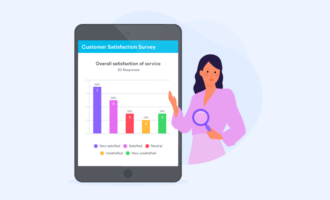
How to analyze survey data

Survey report examples with informative visuals
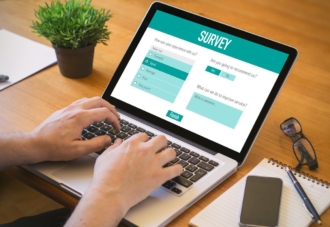
4 survey design tips to get more accurate results

20 pre-training survey questions for a professional development course
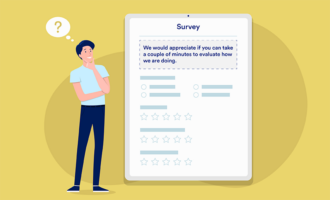
How to write a survey introduction (plus examples)

How to collect secure survey data

How to measure customer experience: Key metrics and KPIs

How to do a poll in Slack

8 of the best WordPress survey plug-ins

Top 6 advantages of open-ended questions

Ethnicity survey questions: Benefits and examples

How to write a survey report

What are the best website survey questions?

A Guide to Creating the Perfect Survey Form

Basic product survey questions to ask customers

What is a survey?

Multiple-choice survey questions: Examples and tips

How to create an inviting welcome screen for online forms

25 post-training survey questions to ask employees

10 of the best StrawPoll alternatives

Using survey logic to elicit better survey responses

Webinar: How to use surveys and email marketing to gain key insights
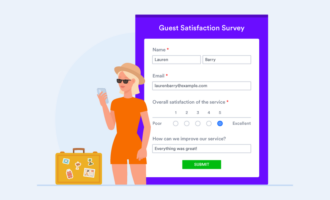
Survey rating scales 1-5: Understand your audience better
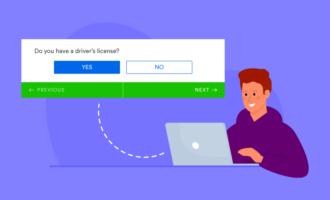
Yes-or-no questions in online forms and surveys

Survey questions 101: Examples and tips

Top 7 KwikSurveys alternatives in 2024

How to create an employee pulse survey

How to ask someone to fill out a survey

How to embed a survey in a website

Top 9 Qualaroo alternatives in 2024

SurveyMonkey vs SurveySparrow

The 6 best customer satisfaction survey tools

CRM survey benefits, best practices, and example questions

How to get the most out of Peakon surveys

Survey data collection: 5 best practices

What is a good Net Promoter Score® (NPS®)?

SurveyLegend alternatives in 2024

Pre-sales surveys: How to focus on your best leads

5 types of questionnaires

How to send surveys: 7 survey distribution methods

11 top survey incentive ideas

Exit survey questions to ask your former employees

8 employee-of-the-month survey questions you should ask

6 effective ways to find survey participants

How to make Google Forms anonymous

How to calculate the Net Promoter Score® (NPS®)

Top 14 demographic survey questions to ask

4 types of survey questions to engage your audience

Types of survey bias and ways to avoid them

Best training survey questions to evaluate effectiveness

How to add a “poor to excellent” scale to your surveys

The 28 best post-purchase survey questions to ask your customers

How to conduct a pricing survey: Questions to ask

20 essential human resources (HR) survey questions

How to write a research question

The 3 best Checkbox Survey alternatives

What is the smiley face rating scale?

How to write a survey reminder email

80 survey question examples and when to use them

What you need to know about SurveyMonkey pricing

10 AidaForm alternatives that make data collection a breeze in 2024

Survicate vs SurveyMonkey: Comparing online survey platforms

Cybersecurity questionnaires: How to assess online threats
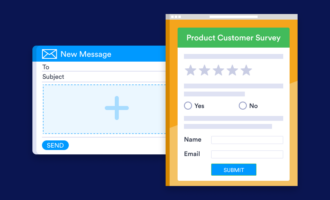
How to embed a survey in an email
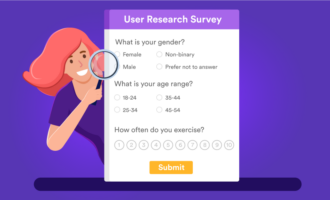
6 best survey tools for research

5 UX survey tools to help you create a winning user experience

The best newsletter survey questions to ask

Social media survey questions: Examples and best practices

Qualtrics vs SurveyMonkey: Which should you choose?

How to add a popup survey on your website

How to create a survey in Google Forms

The 5 most powerful Bucket.io alternatives for 2024

20 psychology survey questions to ask your clients

How to write unbiased survey questions

Top 3 SurveySparrow alternatives in 2024

5 tips for creating great qualitative surveys

How to ask someone to take a survey via email

Top podcast survey questions to ask guests and listeners

How to send a survey to your email list on AWeber

SurveyMonkey vs Alchemer (Formerly SurveyGizmo)

What is a good survey response rate?

The leadership survey questions every company should ask

How to turn survey results into a great presentation

How to close a survey on SurveyMonkey

Parent survey questions: What to ask and why
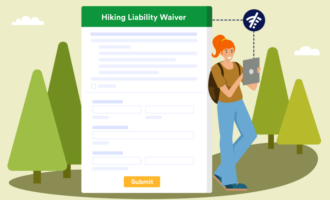
Offline surveys: How to collect data anywhere

4 tips for creating effective quantitative surveys

How to set up and send a Constant Contact survey

50 mental health survey questions to ask employees

How to send Mailchimp surveys easily

How to use open-ended survey questions

65+ e-commerce survey questions for valuable business insights

How to add a signature in SurveyMonkey

Peakon alternatives in 2024

Top 15 employee pulse survey tools

How is public opinion measured with surveys?

10 questions to ask in your membership survey
Send Comment :
- Solutions Industry Gaming Automotive Sports and events Education Government Travel & Hospitality Financial Services Healthcare Cannabis Technology Use case NPS+ Communities Audience Contactless surveys Mobile LivePolls Member Experience GDPR Employee Experience Conjoint
- Resources Blog eBooks Survey Templates Case Studies Training Help center
Hotel Survey Questions for Guest Feedback & Satisfaction Questionnaire
This resort and hotel satisfaction survey questionnaire has the right set of questions for general and targeted hotel feedback surveys. Survey templates such as this one help hotels collect insights from their guests and take decisions to serve them better. One of the questions, "According to your most recent experience, rate the following attributes?" will help hotels understand customer opinions about the quality of various attributes. Use this sample questionnaire to discover scopes of improvement and make your hotel's services better with each visitor.
What is Hotel Survey? A hotel survey is a type of research instrument used to collect feedback and opinions from guests about their experience staying at a hotel. It typically consists of a set of questions designed to evaluate various aspects of the hotel, such as the quality of the amenities, the cleanliness of the rooms, the level of customer service, and the overall satisfaction of the guests. The survey may be conducted in various formats, such as online, paper-based, or through interviews, and is often used by hotels to gather feedback from guests to improve their services and enhance their overall guest experience. Free Hotel Survey Templates for Guests These templates are pre-built surveys designed by experts to capture the most relevant and vital feedback from hotel guests. By using free hotel survey templates, such as those offered, hoteliers can save time and effort in survey creation and focus on analyzing the data collected to make data-driven decisions. You can easily use or customize our templates according to the hotel's unique requirements. Our free hotel survey templates allow to gain valuable insights into their guests' experiences and take the necessary steps to improve their services and grow their businesses. use this free template Preview this template Desktop Created with Sketch. Mobile Created with Sketch. Please take a moment to rate our services. Thank you for giving us the opportunity to serve you. Considering your complete experience at our hotel, how likely would you be to recommend us to a friend or a colleague? 0 Very Unlikely to 10 Very Likely 0 1 2 3 4 5 6 7 8 9 10 Very Unlikely Very Likely Excellent Good Average Below average Poor N/A Menu Variety Excellent Good Average Below average Poor N/A Value for price paid Excellent Good Average Below average Poor N/A Promptness of service Excellent Good Average Below average Poor N/A Quality of service Excellent Good Average Below average Poor N/A Quality of food Excellent Good Average Below average Poor N/A Quality of beverage Excellent Good Average Below average Poor N/A $(function() {qp_sectionDisplayScript.detectMatrixScroll();}); How would you rate our resort on the basis of the below? Excellent Good Average Below average Poor N/A Our staff's hospitality? (Friendliness, courtesy, responsiveness) Excellent Good Average Below average Poor N/A Resort's public areas? Excellent Good Average Below average Poor N/A Value for the price paid? Excellent Good Average Below average Poor N/A Ability to provide a relaxing atmosphere? Excellent Good Average Below average Poor N/A $(function() {qp_sectionDisplayScript.detectMatrixScroll();}); Please rate the following: Excellent Good Average Below average Poor N/A Decor Excellent Good Average Below average Poor N/A Cleanliness Excellent Good Average Below average Poor N/A Condition of rooms Excellent Good Average Below average Poor N/A Housekeeping services Excellent Good Average Below average Poor N/A Heating/cooling within the room Excellent Good Average Below average Poor N/A $(function() {qp_sectionDisplayScript.detectMatrixScroll();}); Comments Email Address (Optional) $(function() {qp_sectionDisplayScript.stopEnterSubmit($('[name=t_20750]'));}); use this free template Top 3 reasons to use this hotel and resort survey template
Measure the hotel's net promoter score:.
It measures the net promoter score of the resort by calculating the percentage of guests who are promoters and subtract the percentage of customers who are detractors.
Evaluate guest satisfaction on important hospitality parameters:
This survey questionnaire evaluates the overall hospitality of the resort based on parameters like location, value, food, price, ambiance, and cleanliness.
Collect feedback on resort ambiance:
Gather feedback on your resort atmosphere and improve it to serve the new guest better. It also evaluates how the resort environment boosts the customer's happiness level.
Guest Evaluation Survey Template
Event survey template, resort evaluation survey template.
- Sample Questions
- Sample Reports
- Survey Logic
- Integrations
- Professional Services
- Survey Software
- Customer Experience
- Communities
- Polls Explore the QuestionPro Poll Software - The World's leading Online Poll Maker & Creator. Create online polls, distribute them using email and multiple other options and start analyzing poll results.
- Research Edition
- Survey Templates
- Case Studies
- Coronavirus Resources
- Qualtrics Explore the list of features that QuestionPro has compared to Qualtrics and learn how you can get more, for less.
- SurveyMonkey
- VisionCritical
- Market Research Survey Software Real-time, automated and advanced market research survey software & tool to create surveys, collect data and analyze results for actionable market insights.
- Employee Survey Software Employee survey software & tool to create, send and analyze employee surveys. Get real-time analysis for employee satisfaction, engagement, work culture and map your employee experience from onboarding to exit!
- Customer Survey Software Robust, automated and easy to use customer survey software & tool to create surveys, real-time data collection and robust analytics for valuable customer insights.
- Community Survey Software Use the community survey software & tool to create and manage a robust online community for market research. Collect community feedback and insights from real-time analytics!
- Web Survey Software Powerful web survey software & tool to conduct comprehensive survey research using automated and real-time survey data collection and advanced analytics to get actionable insights.
- Mobile Survey Software Leverage the mobile survey software & tool to collect online and offline data and analyze them on the go. Create and launch smart mobile surveys!
- Business Survey Software Powerful business survey software & tool to create, send and analyze business surveys. Get actionable insights with real-time and automated survey data collection and powerful analytics!
- Enterprise Survey Software Real time, automated and robust enterprise survey software & tool to create surveys. collect data and analyze responses to get quick actionable insights.
- Email Survey Software Robust email survey software & tool to create email surveys, collect automated and real-time data and analyze results to gain valuable feedback and actionable insights!
- SMS Survey Software Use the power of SMS to send surveys to your respondents at the click of a button. SMS survey software and tool offers robust features to create, manage and deploy survey with utmost ease.
- Offline Surveys
- Customer Satisfaction Surveys
- Net Promoter Score (NPS) Learn everything about Net Promoter Score (NPS) and the Net Promoter Question. Get a clear view on the universal Net Promoter Score Formula, how to undertake Net Promoter Score Calculation followed by a simple Net Promoter Score Example.
- Conjoint Analysis
- GDPR & EU Compliance
- Likert Scale Complete Likert Scale Questions, Examples and Surveys for 5, 7 and 9 point scales. Learn everything about Likert Scale with corresponding example for each question and survey demonstrations.
- Executive Team
- Advisory Board
- Testimonials
- In the news
QuestionPro in your language
- Encuestas Online
- Pesquisa Online
- Umfrage Software
- Сервис опросов
- برامج للمسح
- Logiciel d'enquête
Awards & certificates
The experience journal.
Find innovative ideas about Experience Management from the experts
- Privacy Statement
- Terms of Use
- Cookie Settings
Creating a survey with QuestionPro is optimized for use on larger screens -
Though you're welcome to continue on your mobile screen, we'd suggest a desktop or notebook experience for optimal results.
- Travel, Tourism & Hospitality ›
- Accommodation
Hotel industry worldwide - statistics & facts
What are the biggest hotel companies in the world, markets with the most hotel projects in the pipeline worldwide, key insights.
Detailed statistics
Global hotel and resort industry market size worldwide 2013-2023
Hotel openings worldwide 2021-2024
Market value of biggest global hotel and resort companies 2023
Editor’s Picks Current statistics on this topic
Current statistics on this topic.
Leading hotel companies worldwide 2023, by number of properties
Most valuable hotel brands worldwide 2023, by brand value
Related topics
Recommended.
- Tourism worldwide
- Cruise industry worldwide
- Hospitality industry in Canada
Recommended statistics
Industry overview.
- Premium Statistic Global hotel and resort industry market size worldwide 2013-2023
- Premium Statistic Hotel openings worldwide 2021-2024
- Premium Statistic Hotel room openings worldwide 2021-2024
- Premium Statistic Monthly occupancy rate of hotels worldwide 2020-2023
- Premium Statistic Monthly hotel occupancy rates worldwide 2020-2023, by region
- Premium Statistic Change in monthly number of hotel bookings worldwide 2020-2023
- Premium Statistic Change in monthly number of hotel bookings worldwide 2020-2023, by region
Market size of the hotel and resort industry worldwide from 2013 to 2022, with a forecast for 2023 (in trillion U.S. dollars)
Number of hotels opened worldwide from 2021 to 2022, with a forecast for 2023 and 2024
Hotel room openings worldwide 2021-2024
Number of hotel rooms opened worldwide from 2021 to 2022, with a forecast for 2023 and 2024
Monthly occupancy rate of hotels worldwide 2020-2023
Monthly occupancy rate of hotels worldwide from 2020 to 2023
Monthly hotel occupancy rates worldwide 2020-2023, by region
Monthly hotel occupancy rates worldwide from 2020 to 2023, by region
Change in monthly number of hotel bookings worldwide 2020-2023
Year-over-year monthly change in number of hotel bookings worldwide from 2020 to 2023
Change in monthly number of hotel bookings worldwide 2020-2023, by region
Year-over-year monthly change in number of hotel bookings worldwide from 2020 to 2023, by region
Key players
- Premium Statistic Market value of biggest global hotel and resort companies 2023
- Premium Statistic Sales of biggest global hotel and resort companies 2023
- Premium Statistic Most valuable hotel brands worldwide 2023, by brand value
- Basic Statistic Leading hotel brands in the world 2022, by traveler ratings
Leading hotel and resort companies worldwide in 2023, by market value (in billion U.S. dollars)
Sales of biggest global hotel and resort companies 2023
Leading hotel and resort companies worldwide in 2023, by sales (in billion U.S. dollars)
Leading hotel brands based on brand value worldwide in 2023 (in billion U.S. dollars)
Leading hotel brands in the world 2022, by traveler ratings
Best-rated hotel brands worldwide in 2022, based on traveler scores
Digitalization
- Premium Statistic Change in monthly number of online hotel searches worldwide 2020-2023, by region
- Premium Statistic Technologies global hotels plan to implement in the next three years 2022
- Premium Statistic COVID-19 hotel technologies or services that global consumers want long-term 2022
- Premium Statistic Hotel technologies global consumers think would improve their future stay 2022
- Premium Statistic Guests interested in touring hotels using VR/metaverse technology worldwide 2022
- Premium Statistic Guests interested to stay at hotels with automated messaging/chatbots worldwide 2022
- Premium Statistic Guests more likely to stay at hotels with self-service technology worldwide 2022
Change in monthly number of online hotel searches worldwide 2020-2023, by region
Year-over-year monthly change in number of online hotel searches worldwide from 2020 to 2023, by region
Technologies global hotels plan to implement in the next three years 2022
Technologies hotels are most likely to implement in the next three years worldwide as of 2022
COVID-19 hotel technologies or services that global consumers want long-term 2022
Hotel technologies or services popularized during the pandemic that travelers would like to see permanently adopted worldwide as of 2022
Hotel technologies global consumers think would improve their future stay 2022
Must-have hotel technologies to create a more amazing stay in the future among travelers worldwide as of 2022
Guests interested in touring hotels using VR/metaverse technology worldwide 2022
Share of travelers that are interested in using a virtual reality/metaverse experience to tour a hotel before booking worldwide as of 2022
Guests interested to stay at hotels with automated messaging/chatbots worldwide 2022
Share of travelers that are interested in staying at a hotel offering automated messaging or a chatbot to provide support for most customer service requests worldwide as of 2022
Guests more likely to stay at hotels with self-service technology worldwide 2022
Share of travelers that would be more likely to stay at a hotel offering self-service technology that minimizes contact with staff worldwide as of 2022
Construction outlook
- Premium Statistic Countries with the most hotel construction projects in the pipeline worldwide 2022
- Premium Statistic Countries with the largest amount of hotel rooms in the construction pipeline 2022
- Premium Statistic Cities with the most lodging projects in the pipeline worldwide 2022
- Premium Statistic Cities with the largest amount of lodging rooms in the pipeline worldwide 2022
- Premium Statistic Number of rooms in the pipeline worldwide 2022, by company
Countries with the most hotel construction projects in the pipeline worldwide 2022
Countries with the highest number of hotel construction projects in the pipeline worldwide as of Q4 2022
Countries with the largest amount of hotel rooms in the construction pipeline 2022
Countries with the highest number of hotel rooms in the construction pipeline worldwide as of Q4 2022
Cities with the most lodging projects in the pipeline worldwide 2022
Cities with the highest number of lodging projects in the construction pipeline worldwide as of Q4 2022
Cities with the largest amount of lodging rooms in the pipeline worldwide 2022
Cities with the highest number of lodging rooms in the construction pipeline worldwide as of Q4 2022
Number of rooms in the pipeline worldwide 2022, by company
Number of hotel rooms in the construction pipeline worldwide as of Q4 2022, by company
Further reports Get the best reports to understand your industry
Get the best reports to understand your industry.
Mon - Fri, 9am - 6pm (EST)
Mon - Fri, 9am - 5pm (SGT)
Mon - Fri, 10:00am - 6:00pm (JST)
Mon - Fri, 9:30am - 5pm (GMT)
Explore Jobs
- Jobs Near Me
- Remote Jobs
- Full Time Jobs
- Part Time Jobs
- Entry Level Jobs
- Work From Home Jobs
Find Specific Jobs
- $15 Per Hour Jobs
- $20 Per Hour Jobs
- Hiring Immediately Jobs
- High School Jobs
- H1b Visa Jobs
Explore Careers
- Business And Financial
- Architecture And Engineering
- Computer And Mathematical
Explore Professions
- What They Do
- Certifications
- Demographics
Best Companies
- Health Care
- Fortune 500
Explore Companies
- CEO And Executies
- Resume Builder
- Career Advice
- Explore Majors
- Questions And Answers
- Interview Questions
25 Hotel Industry Statistics [2023]: Hotel Rate Trends And Market Data

- Wedding Industry Statistics
- Yoga Industry Statistics
- Music Industry Statistics
- Landscaping Industry Statistics
- Bicycle Industry Statistics
- Coffee Industry Statistics
- Car Rental Industry Statistics
- Home Improvement Industry Statistics
- Insurance Industry Statistics
- Supplements Industry Statistics
- Golf Industry Statistics
- Fitness Industry Statistics
- US Media And Entertainment Industry Statistics
- Firearm Industry Statistics
- Financial Services Industry Statistics
- Health And Wellness Industry Statistics
- Trucking Industry Statistics
- Wine Industry Statistics
- Pet Industry Statistics
- Mobile App Industry Statistics
- Digital Marketing Industry Statistics
- Hotel Industry Statistics
- Retail Statistics
- Robotics Industry Statistics
- Jewelry Industry Statistics
- Appointment Scheduling statistics
- Restaurant Industry Statistics
- Food Delivery Statistics
- Food Truck Industry
- Fashion Industry
- Real Estate Industry
- US Film Industry
- US Beverage Industry
- USu202fFast Food Restaurants
- US Construction Industry
- US Book Industry
- Cosmetics Industry
- US Food Retail Industry
- US Pharmaceutical Industry
- US Healthcare Industry
- Airline Industry
- Automobile Industry
- Transportation Industry Statistics
- Event Industry Statistics
- Project Management Statistics
- Oil And Gas Industry Statistics
- Nursing Home Statistics
- Nursing Shortage Statistics
- Nursing Statistics
Research Summary. The hotel industry not only reaches across the globe but also spans a wide cross-section of options ranging from budget motels to luxury resorts, making it an interesting field to study. Here are the key statistics on the hotel industry:
There are at least 187,000 hotels in the world as of 2023.
There are an estimated 17.5 million guestrooms in the world.
The global hospitality industry is worth over $4.548 trillion as of 2022.
There are about 1.6 million people employed by the U.S.’s accommodation industry.
The global travel and tourism industry was worth $4.671 trillion in 2020 , down from its $9.17 trillion value in 2019.
The average U.S. hotel occupancy rate is 64.2% as of February 2023.

Hotel Industry Statistics by Consumer Preferences
78% of millennials would rather spend their money on experiences than on things.
Hotels with a significant number of high-quality photos on their websites see a 15% increase in conversion rates.
This is compared to hotels that use few and/or low-quality photos. Including good photos of hotel rooms and amenities helps travelers know what they’re getting into and better imagine themselves there.
TripAdvisor shared that the number of photos a hotel has on its TripAdvisor profile has the most impact on traveler engagement with the listing.
More specifically, properties with at least one photo see a 138% increase in engagement and are 225% more likely to receive a booking inquiry, and those with over 100 photos see a 151% increase in engagement and are 283% more likely to receive a booking inquiry.
Europe has the highest hotel occupancy rate of any region in the world.
As of 2019, European hotels have an occupancy rate of 72.2%, meaning an average of 72.2% of all hotel rooms are occupied.
US Hotel Industry Statistics
There are 90,562 hotel and motel businesses in the U.S.
This number is a 0.4% increase from 2021, which is on trend with the average annual growth rate of 0.4% that this industry has seen from 2017 to 2022.
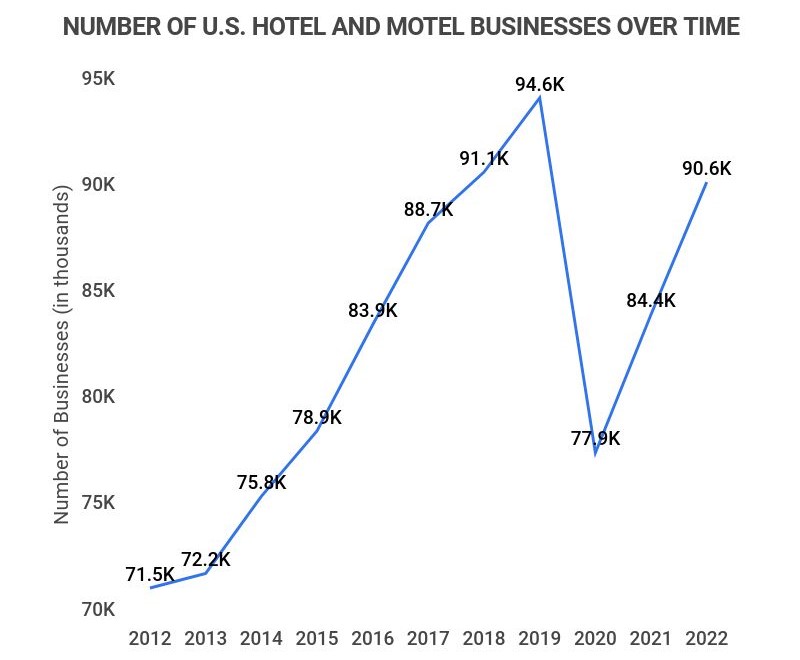
There are approximately 5.29 million hotel rooms in the U.S.
The U.S. hotel and motel industry is worth $177.6 billion.
This industry is predicted to grow by 33.6% throughout 2022 as it continues to recover from the COVID-19 pandemic, although it’s seen an average annual decline of 2.4% from 2017 to 2022.
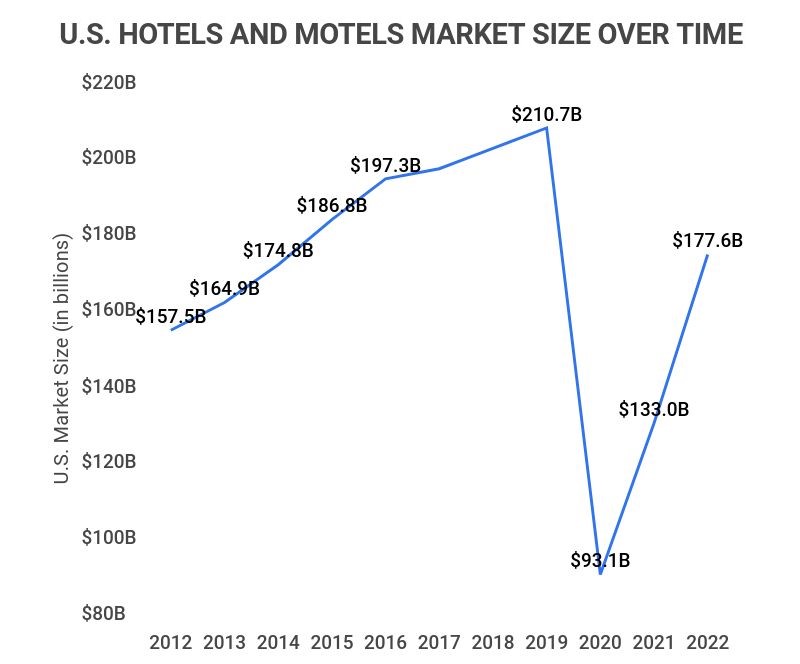
The U.S. tourism industry was valued at $545.11 billion in 2020.
In 2020, U.S. hotels had an average occupancy rate of 44%.
Hotel Industry Statistics by Employment
The U.S.’s accommodation industry employs about 1.6 million people.
In Q1 2019, there were 1.352 million gross job gains in the U.S. leisure and hospitality sector.
Here are data points for each quarter from Q1 2019 through Q2 2021.
In Q1 of 2019, there were 1.22 million gross job losses in the U.S. leisure and hospitality industry.
Here are the numbers for each quarter following that through Q2 2021:
The average employee of the U.S. leisure and hospitality industry makes $19.44 an hour.
32% of U.S. leisure and hospitality industry employees have access to employer-sponsored health care.
43% get paid vacation from their employers, and 50% receive paid sick leave .
Hotel Industry Trends and Projections
In 2019, the global hotels and resorts market was worth over $1.5 trillion.
This was just before the COVID-19 pandemic caused widespread lockdowns in 2020, and it was the pinnacle of seven years of nearly continuous growth.
From 2021 to 2025, the global hotel and travel accommodation industry is projected to have a CAGR of 7%.
This will result in a market value of $1.05 trillion in 2025. In 2020, the global hotel and travel accommodation market was worth $673.02 billion, and it grew to $801.9 billion in 2021, which is a CAGR of 19.1%.
In 2020, travel and tourism contributed $4.671 trillion to the global GDP.
While this is a significant amount of money, it is also a significant decrease from the $9.17 trillion it contributed in 2019. This is a result of the 2020 COVID-19 lockdowns that significantly reduced the amount of travel in the world.
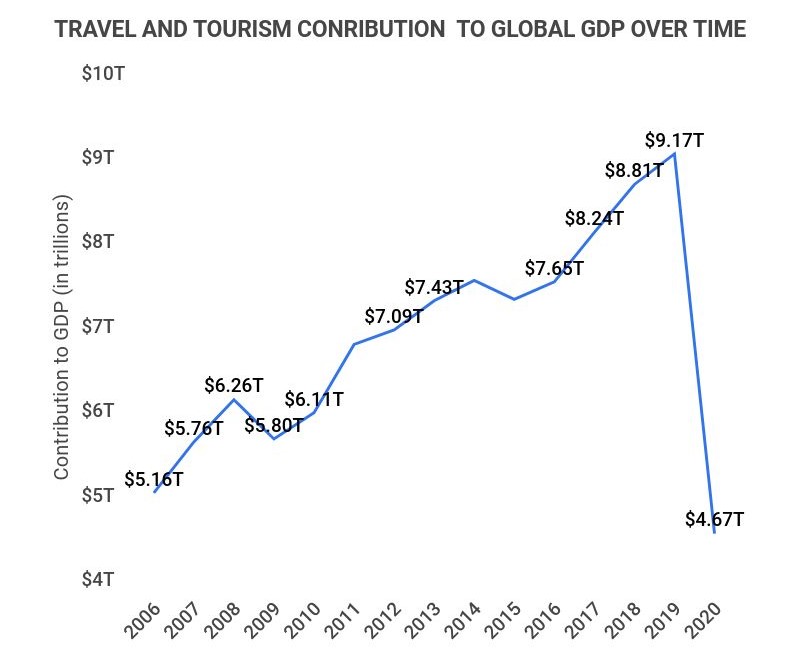
From 2008 to 2018, the number of hotels around the world has increased by nearly 14,300.
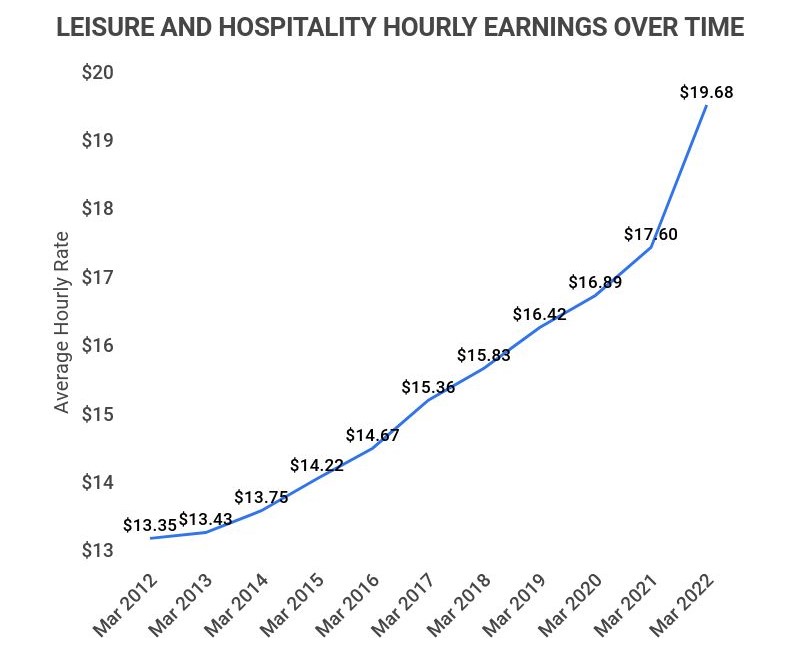
Hotel Industry Statistics FAQ
What is the growth rate of the hotel industry?
The growth rate of the hotel industry is 19.1%. This was the CAGR from 2020 to 2021 as the global hotel industry reopened after the COVID-19 pandemic lockdowns began to lift.
What are the four segments of the hospitality industry?
The four segments of the hospitality industry are Food and Beverage, Accommodation (also referred to as Lodging), Travel and Tourism, and Entertainment and Recreation.
You don’t necessarily have to be traveling to enjoy the hospitality industry’s offerings. The Food and Beverage sector, for example, includes restaurants , bowling alley food, and concessions stands, not just hotel restaurants. As a result, this is the largest sector of the hospitality industry.
The Accommodation or Lodging sector includes hotels, campgrounds, rental homes, and any other facility that gives people a place to sleep. This includes resorts, motels, and hostels all alike.
The Travel and Tourism sector covers the actual act of traveling via airlines, cruise ships, trains, taxis, and more. Whether you’re traveling for leisure or business, chances are you’ll utilize at least one of travel and tourism’s offerings on a trip.
The last sector of the hospitality industry is Entertainment and Recreation. This sector is made up of all the activities that people do just for the enjoyment of it. These include:
Swimming pools
Spectator sports
Movie theaters
Participatory sports (e.g., scuba diving, golf, tennis)
Amusement parks
How many American hospitality workers were fired or laid off in 2020?
10.65 million American hospitality workers were fired or laid off in 2020. While About 1.2 to 1.4 million people in this industry lost their jobs each quarter throughout 2019, 1.695 found themselves unemployed in Q1 2020, and a whopping 6.331 million were suddenly unemployed in Q2 2020 due to the COVID-19 pandemic lockdowns.
Is the hotel industry recovering?
Yes, the hotel industry is recovering. The global hotel and travel accommodation industry is expected to have a CAGR of 7% from 2021 to 2025.
What are the latest trends in the hotel industry?
The latest trends in the hotel industry are high-tech, green facilities, alternative accommodation options, and incorporating experiences into hotel stays.
Hotels are beginning to implement more and more smart technology, whether it’s a keyless entry or turning on the AC with an app. In addition, many hotels are looking for ways to reduce their carbon footprint by conserving water, reducing single-use plastics, and earning their LEED certifications.
Another hotel industry trend is that travelers (especially millennials) are looking more toward alternative accommodation options, whether that’s a rental house or villa, a mobile home, or hotels with a personality that reflect the local culture rather than standardized branding.
Hotels are responding to this by focusing on opening boutique hotels and facilities that bring unique elements to their decor, amenities, and even floor plans.
The hotel industry is a major player in the global and U.S. economies. In 2022, the global hotel industry was worth more than $4.548 trillion and is projected to see a CAGR of 7% from 2021 to 2025. In the U.S. alone, the hotel and motel industry is worth $177.6 billion, and the tourism industry is worth $545.11 billion.
Lockdowns in response to the COVID-19 pandemic in 2020 significantly impacted this industry. The worldwide travel and tourism industry contributed $4.671 trillion to the global GDP in 2020, which is just over half the amount it contributed in 2019 ($9.17 trillion).
In the U.S., over seven million leisure and hospitality industry employees lost their jobs during the first six months of 2020, compared to the just over five million that found themselves unemployed throughout all of 2019. Hotel occupancy rates also dropped by 33.3% from 2019 to 2020.
Eventbrite. “ Millennials: Fueling the Experience Economy. ” Accessed on February 16, 2022.
Medium . “ The Importance of Imagery on Hotel Websites. ” Accessed on February 16, 2022.
Frederic Gonzalo. “ Photos Impact Bookings More Than Reviews. ” Accessed on February 16, 2022.
Statista. “ Occupancy Rate of the Hotel Industry Worldwide From 2008 to 2019, by Region. ” Accessed on February 16, 2022.
IBISWorld. “ Hotels & Motels in the U.S. – Number of Businesses 2005-2027. ” Accessed on February 16, 2022.
Statista. “ Number of Hotel Rooms in the United States From 2017 to 2020, by Chain Scale Segment. ” Accessed on February 16, 2022.
IBISWorld. “ Hotels & Motels in the U.S. – Market Size 2005-2027. ” Accessed on February 16, 2022.
Statista. “ Market Size of the Tourism Sector in the United States From 2011 to 2020, with a Forecast for 2021. ” Accessed on February 16, 2022.
Statista. “ Occupancy Rate of Hotel Industry in the United States From 2001 to 2020. ” Accessed on February 16, 2022.
U.S. Bureau of Labor Statistics. “ Accommodation: NAICS 721. ” Accessed on February 16, 2022.
U.S. Bureau of Labor Statistics. “ Economic News Release: Employment Situation Summary. ” Accessed on February 16, 2022.
U.S. Bureau of Labor Statistics. “ Databases, Tables & Calculators by Subject: Gross Job Gains for the Leisure and Hospitality Sector in the U.S. (Rounded to the Nearest Thousands.) ” Accessed on February 16, 2022.
U.S. Bureau of Labor Statistics. “ Databases, Tables & Calculators by Subject: Gross Job Losses for the Leisure and Hospitality Sector in the U.S. (Rounded to the Nearest Thousands). ” Accessed on February 16, 2022.
U.S. Bureau of Labor Statistics. “ Leisure and Hospitality. ” Accessed on February 16, 2022.
IBISWorld. “ Global Hotels & Resorts – Market Size 2005-2027. ” Accessed on February 16, 2022.
Globe Newswire. “ Global Hotel and Other Travel Accommodation Market Report 2021: Market is Expected to Grow From $673.02 Billion in 2020 to $801.9 Billion in 2021 – Long-term Forecast to 2025 & 2030. ” Accessed on February 16, 2022.
Statista. “ Total Contribution of Travel and Tourism to Gross Domestic Product (GDP) Worldwide From 2006 to 2020. ” Accessed on February 16, 2022.
Statista. “ Total Number of Hotels Worldwide From 2008 to 2018. ” Accessed on February 16, 2022.
Hospitality Net. “ What Are the 4 Segments of the Hospitality Industry. ” Accessed on February 16, 2022.
Hotel Tech Report. “ 100 Hotel Trends You Need To Watch in 2022 & Beyond. ” Accessed on February 16, 2022.
How useful was this post?
Click on a star to rate it!
Average rating / 5. Vote count:
No votes so far! Be the first to rate this post.

Abby is a writer who is passionate about the power of story. Whether it’s communicating complicated topics in a clear way or helping readers connect with another person or place from the comfort of their couch. Abby attended Oral Roberts University in Tulsa, Oklahoma, where she earned a degree in writing with concentrations in journalism and business.
Recent Job Searches
- Registered Nurse Jobs Resume Location
- Truck Driver Jobs Resume Location
- Call Center Representative Jobs Resume Location
- Customer Service Representative Jobs Resume
- Delivery Driver Jobs Resume Location
- Warehouse Worker Jobs Resume Location
- Account Executive Jobs Resume Location
- Sales Associate Jobs Resume Location
- Licensed Practical Nurse Jobs Resume Location
- Company Driver Jobs Resume
Related posts
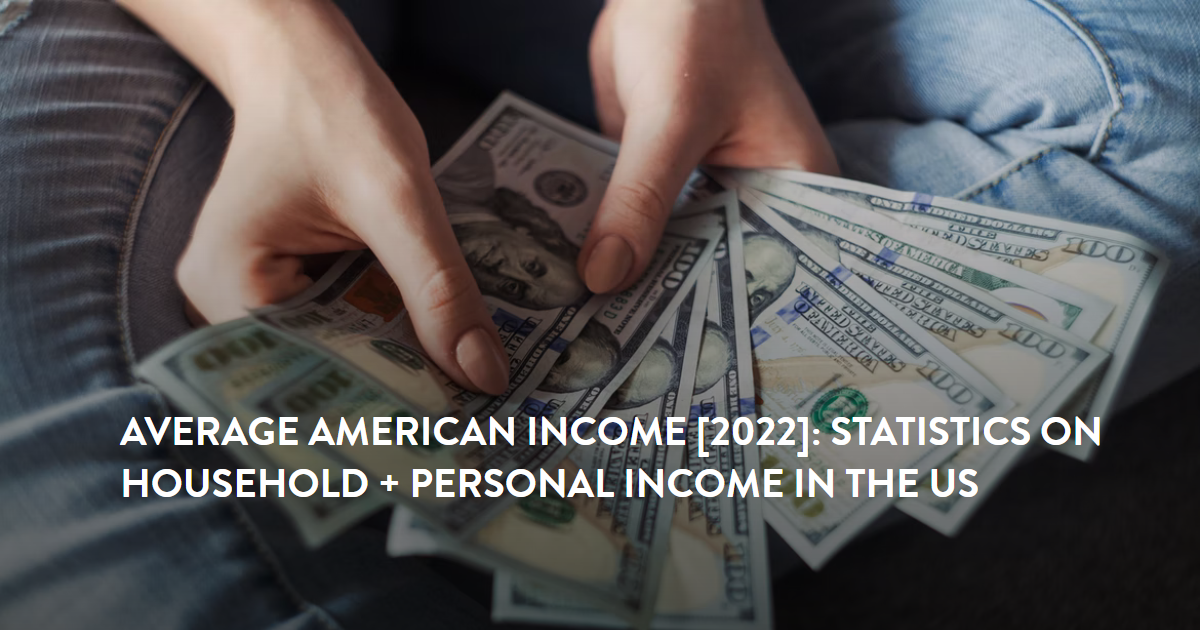
Average American Income | 25 U.S. Salary Statistics [2023]
What Companies Are In The Basic Industries Field?

How Many Blog Posts Are Published Per Day? [2023]

Do You Feel Guilty About Taking Time Off Work? [Survey Results]
- Career Advice >
- Industry Statistics >
- På svenska
- Ammattikorkeakoulut
- Lahden ammattikorkeakoulu
- Opinnäytetyöt
- Näytä viite
City Marketing : Case: Moscow
Kuzina, irina (2017).

Avaa tiedosto
Tiivistelmä, selaa kokoelmaa, henkilökunnalle.

IMAGES
VIDEO
COMMENTS
Because of this, market research questions for hotels must be written clearly with a goal in mind. Trustworthy results. This goes back to expertise. When a travel and tourism market research company runs a project, a hotel or related organization can feel confident knowing the data they're receiving is high-quality. The level of expertise ...
Conducting market research to understand how to open a hotel also requires a thorough analysis of the competition at the local level. Start by rounding up all the hotels (as well as guest houses and hostels) located near your business. You should look at their concept, the type of accommodation and rates they're offering and their target ...
Hotel market research plays a critical role in hospitality companies' decision-making process. It analyzes consumer behaviors and patterns, forecasts future trends, and enables businesses to develop customized strategies for their market. As a result, hotel market research is a valuable source of information on consumer trends and the overall ...
Profit & Loss Statement. The key question as always is how much money will your hotel make. Investors are logically keen to know what kind of return on investment to expect. Based on your market research and competitive analysis you will need to make a founded estimation of what kind of occupancy and average room rate your new hotel can generate.
For existing hotels, market research enables to find attributes that make the brand successful, identify risks with products, and expose holes in competitor's product offerings. ... The industry-standard way to use market research starts by asking relevant questions, identifying known and unknown business risks, and finding focused answers.
The global hotel market was projected to exceed $500 billion by the end of 2014, growing to more than $550 billion by 2016. The American Hotel & Lodging Association counted more than 52,000 lodging properties in the United States (defined as having 15 or more rooms). The fledgling private room rental phenomenon, a trend born out of social media ...
99 market research questions: discover, define, drill down. There's no need to limit yourself! The best types of market research should - and do - include general questions and those addressing both existing and prospective customers. Indeed, an intelligent approach to market research should cover demographic questions all the way to those that'll help you plan a product launch, drill ...
Overall, a market research survey is a useful tool for a hotel business as it helps them to stay competitive and relevant in the market . Hotel Market Research Survey Questions. Looking for a market research survey sample? Some examples of questions you can use in a sample market research survey for your hotel are: 1.
Market research (also called marketing research) is the action or activity of gathering information about market needs and preferences. This helps companies understand their target market — how the audience feels and behaves. For example, this could be an online questionnaire, shared by email, which has a set of questions that ask an audience ...
Luckily, Drive Research has a solution: market research. Our hotel and hospitality market research can help you navigate through the ever-revolving door that is consumer trends with custom qualitative and quantitative methodologies. With Drive Research, you will learn more about guest preferences or expectations and outperform competition ...
They can help you achieve important goals for your hotel: Gauge and enhance guest satisfaction. Identify areas for improvement. Personalize guest experiences. Enhance customer services. Monitor patterns and trends. Build guest loyalty. In essence, hotel guest surveys allow you to shape your services and experiences to create a win-win situation ...
Single User License (10% Off) $5820 $5238. Pre-Book. Enquiry Now. Report Overview. Pricing Details. The hotel industry is a subset of the hospitality industry that focuses on providing lodging services to consumers. There are many different sorts of hotels, which can be classified on the basis of their size, function, service, and pricing.
The global hotels, resorts, and cruise lines market size was valued at USD 524.1 billion in 2021 and is expected to grow at a compound annual growth rate (CAGR) of 17.4% from 2022 to 2030. The growth is attributed to the growing usage of hotels by millennials and gen Z.
All in all, it is your responsibility to determine the questions that will be asked in your own questionnaire, based on our hotel survey questions. 3. Send your hotel survey questions automatically using InputKit. Once you have composed your questions based on our sample hotel questionnaire, it is now time to think about the optimal sending method.
Likert scale market research questions can help you measure the extent of respondents' agreement/disagreement with the given statement. The answer options are arranged from positive to negative sentiments or vice-versa, with the neutral option in the middle. There are two types of Likert scales: 5-point and 7-point.
According to a review of 6 million user-generated reviews and 20 million online comments, guests are more dissatisfied with hotel stays compared to before the pandemic. The biggest decline in guest satisfaction was seen in North America, with a Global Review Index of 83.3 percent, a drop of 3.5 points from 2019.
30 insightful hotel survey questions. Last Update Date: December 1, 2023. While the travel industry on the whole took a hit from the COVID-19 pandemic, forecasters are expecting international travel to make a full recovery in 2023. Travelers are excited to visit new destinations, both internationally and locally, and many will look to hotels ...
This resort and hotel satisfaction survey questionnaire has the right set of questions for general and targeted hotel feedback surveys. Survey templates such as this one help hotels collect insights from their guests and take decisions to serve them better. ... Market Research Survey Software Real-time, automated and advanced market research ...
Market size of the hotel and resort industry worldwide from 2013 to 2022, with a forecast for 2023 (in trillion U.S. dollars) Premium Statistic Hotel openings worldwide 2021-2024
IBISWorld. "Global Hotels & Resorts - Market Size 2005-2027." Accessed on February 16, 2022. Globe Newswire. "Global Hotel and Other Travel Accommodation Market Report 2021: Market is Expected to Grow From $673.02 Billion in 2020 to $801.9 Billion in 2021 - Long-term Forecast to 2025 & 2030." Accessed on February 16, 2022. Statista.
MARKETING RESEARCH. 13 2.1 Definition of the research problem and objectives 13 2.2 Developing the research plan 14 2.2.1 Sources of data 14 2.2.2 Approaches of research and research instruments 14 2.2.3 Sampling plan 15 3 RUSSIAN CONSUMERS 16 3.1 Russian consumer buying behaviour 16 3.2 Russians as tourists 20 4 RESEARCH RESULTS 23
The analysis in this market snapshot is based on a sample of mostly branded hotels within the Moscow hotel market. The sample includes 9,125 rooms. Charts 3 and 4 show the year-to-August hotel performance for the hotel market in Moscow from 2007 to 2009 in Russian roubles and euro. HOTEL PERFORMANCE
In the ever-evolving hospitality industry, the question of how to effectively compensate hotel operators remains crucial. While the basic premise of paying managers for their management skills holds true, the prevalent incentive fee structures may no longer adequately align with market realities, particularly for owners.
The deductive approach was chosen for the research. Both qualitative and quantitative methods are used in order to answer the research question correctly. Primary data is collected from the survey condected among Lahti University of Applied Sciences and Neu Ulm University of Applied Sciences students and interviews of Tourism Department and ...
Find the Best Ski Resorts and Ski Chalets in or near Elektrostal. We Feature Premium Hotels, Resorts, and Slopeside Apartments as well as Ski-in/Ski-out Chalets, Condos, and Cabins. Compare 41 Luxury and Discount Accommodation Options Available. Get Hot Deals in Hottest Destinations on Hotala™.
(SACRAMENTO) The Food and Drug Administration announced Tuesday that samples of pasteurized milk taken from grocery store shelves had tested positive for bird flu, also known as Highly Pathogenic Avian Influenza (HPAI) or H5N1.On Thursday, the agency announced that one in five milk samples nationwide showed genetic traces of the virus. Milk samples from areas with infected herds were more ...